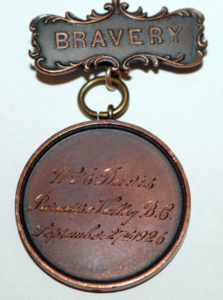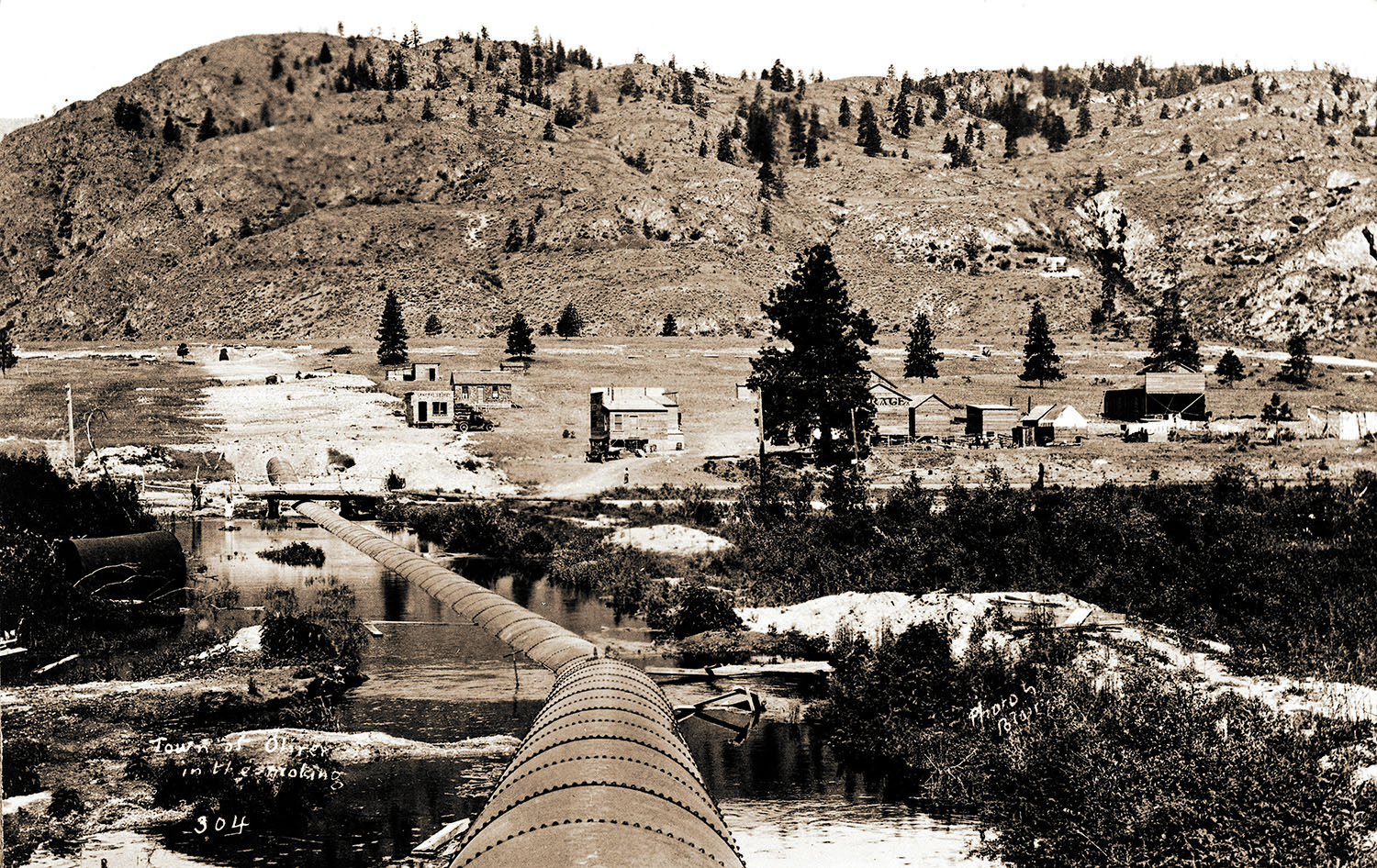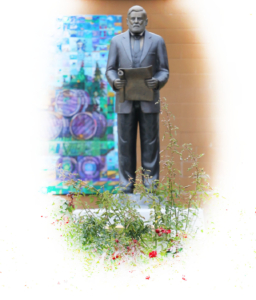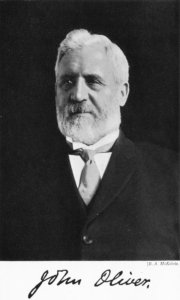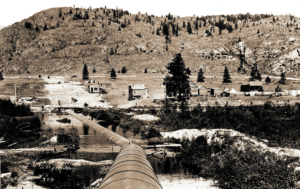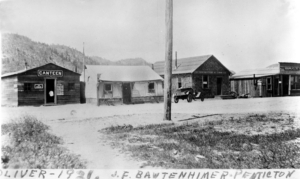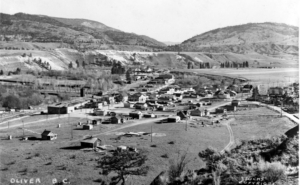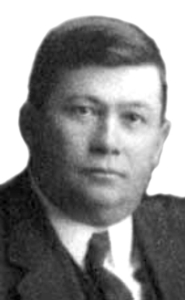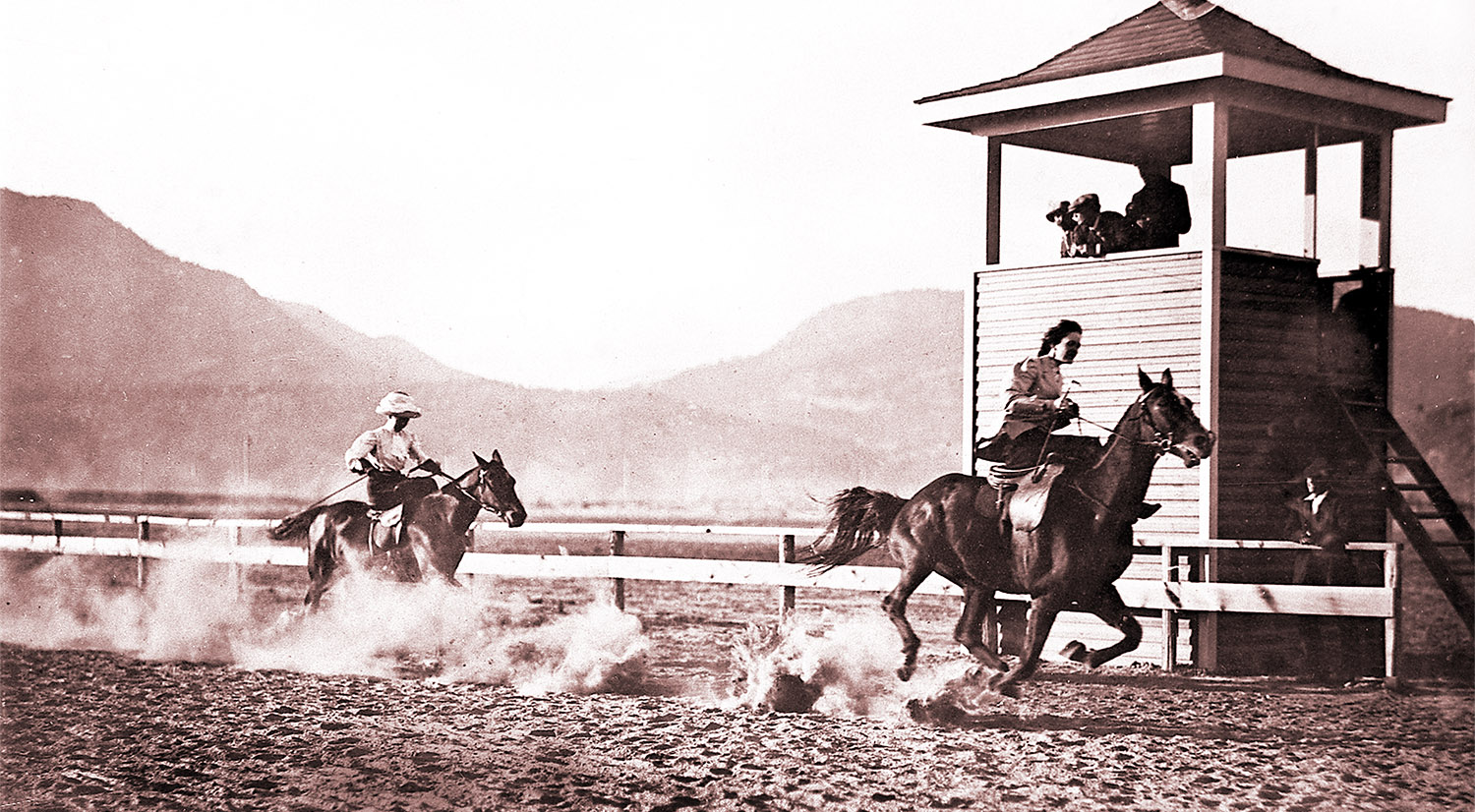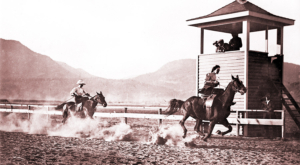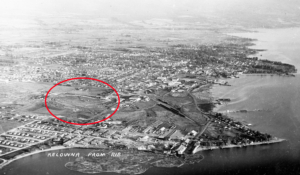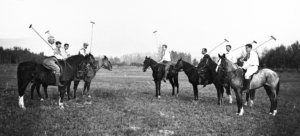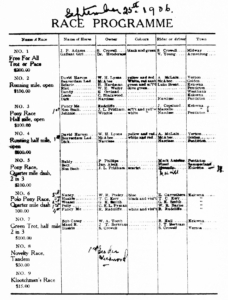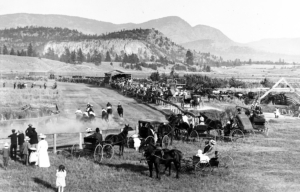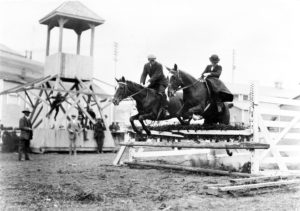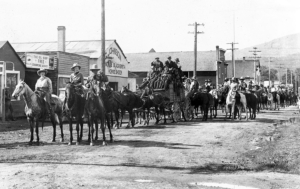Every so often, a collection will pass through our hands at the archive, that will have a significant effect on information already housed here. From our beginnings, the material from Naramata, Summerland and Peachland has included the enterprise and energy of Real Estate magnate, John Moore Robinson. But the personality of the man himself has always been a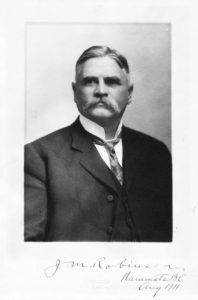 mystery.
mystery.
Then comes his trip diary amongst boxes of family history from Renee Matheson. She is the great-granddaughter of J.M. and she has faithfully preserved this material passed to her from her mother. One of the entries, is this flowery account of an investment fueled trek to Rossland with a psychic mineral witcher. This story places Mr. Robinson in the company of descriptive observers and skilled writers. Editor
THE PLAYERS IN THIS TALE:
THE TEAM
The President: of the Canadian-American Company, Mr. J.M. Robinson.
The Medium: Mrs. Anna Anderson, the mineral psychometrist.
The Expert: Mr. W.G. Shelton, a mining expert.
The Veteran or VET: Mr. R. Chipilt, V.S.
The Reverend or The Invalid: Mr. A.T. Robinson. W.A. Novitiate for theology, out with the party for the benefit of health by the kindness of the President.
The Cook: Billy, alias Fred Scott; packer, chief cook and bottle washer, associate pastor, and general roustabout.
THE CONTROLS FROM THE SPIRIT WORLD
Sam – Rosebud – Reban and a few others
Chapter 1, Town on the Boundary
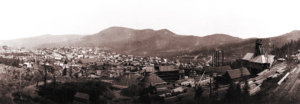 Rossland mining camp is a crow’s nest at the top of the mountain. It is situated about 4,500 feet above sea level, so high that all the inhabitants have to do when they want snow is to go outside and scrape it off the first cloud that comes sailing by.
Rossland mining camp is a crow’s nest at the top of the mountain. It is situated about 4,500 feet above sea level, so high that all the inhabitants have to do when they want snow is to go outside and scrape it off the first cloud that comes sailing by.
The town lies uphill and downhill, but chiefly uphill. In fact, some people say that whatever way you go it is uphill. It is a shining example of nineteenth century enterprise in its origin and growth, and is fast assuming marks of gentility in its external appearance. In 1893, the main street was a yawning abyss but they filled it in and continued on in the march of progress. They gouged sewers out of solid rock, blew up stumps on the back lots, made stairways whereby to scale the slopes, and introduced the electric light, the telephone and a sufficient number of boarding houses, opera houses and whiskey joints to satisfy all the requirements of the hour. Yet a town hall, fire hall and school were left to the benign future for provision.
Meanwhile, mining claims began to grow in number and prominence, ‘till there were probably more claims staked in the vicinity than there were men there to own them. Some were on ledges that not only promised well, but redeemed their promises upon being developed. But as is always, and on the reputation of success, a sinister brood of worthless “propositions” began to be spread far and wide. Many of these were royally entertained by potential investors coming to the front when, an enquiry into the antecedents of one of them having been instituted, it was found this claim amounted to nothing more than a marked sheet of paper and an idea in a person’s head, while another companion proposition was described in the gold commissioner’s report as “a hole in the ground with a box on top.” This gave the “mining boom” a chill, that resulted in ague and paralysis from which it happily never recovered….
What an assembly of good, bad and indifferent characters on the streets of a new mining town! From every tribe and nation under heaven they hail, and act with haste to become rich. There you see the dregs and unwashed of human society, and there beside them, the masterful man of business with his keen eye and comfortable aspect, but both are intent on the one errand, vis a vis money making. To go into a public hall and look over the faces from the platform, as was my pleasure while there, is to be struck with the number of bright looking and handsome young men within the place, and the equally intelligent-looking women. Canada’s very best is represented with all that makes a nation great and good.
The lady who comes to Rossland expecting to see nothing but rustic miners and outmoded garb will find she has reckoned without her host. Going down the main street, lined with blackened stirrups, it is no uncommon thing to come across a vision of beauty and grace, dressed a la mode, sitting in the little shack dignified by the name of “home” and serving her five o’clock tea from delicate china.
Luck is the god of a mining camp, so on Sunday the people either work or witness a baseball match as suits them. The god being blind, and hitting indiscriminately with one hand, while scattering favours by the same method with the other, they take advantage of the opportunity to do as they please. This makes a shockingly gay Sunday to the Canadian just arrived from the decorous east; when he recovers from his shock, unless his objections are grounded on good, sound principles, he is likely to “first endure, then pity, then embrace,” and will turn up in a few years as reckless as the boldest.
In the mines, the men work seven days in the week, not necessarily because of avarice on the part of the management, but generally because the miners, if turned loose on Sunday, would take to the gin mills in the town and very likely not appear again till the following Tuesday or Wednesday. All of which would lead to profanity on the part of the management.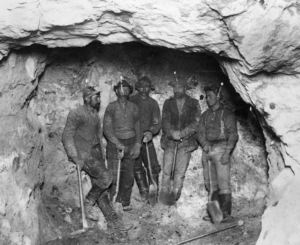
A typical glory hole in the mines of Rossland
In the summertime, the town is dull because so many of the young men have gone prospecting. They usually go in pairs and are gone till autumn, or even till the snows of winter drive them in. During their travels, they may have staked several claims, each 1500 x 1500 feet, and if they show a good surface outcrop of rock carrying mining values, and are not too distant from transportation facilities, then there is a likelihood of being able to sell these at figures ranging from $50 to $5,000. Then the boys have not spent their summer in vain.
If they are thrifty fellows, they will now have enough money ahead to do the required assessment work on the remaining claims next year. But if they are not, and too often this is the case, their money is soon gone and they are reduced to their normal circumstances. It is no unusual thing in Rossland for a fellow to receive a healthy sum from the sale of claims owned in whole or part by him, and at the end of three weeks wake up to find himself stranded again a great many miles from home. But such happenings as that are mere incidents in a place where men’s talk every day concerns thousands and even millions.
How The Expedition Came To Be
Among the scores of companies in Rossland engaged in mining in this year of grace 1897, is the Canadian-America Co., of which I, J.M. Robinson, is President. This company decided to send out during the summer of 1897 a prospecting party to locate mineral claims in its interest on certain prearranged terms. Of the origin and fortunes of that party, it is the purpose of this journal to describe.
It was as unique in its way, perhaps, and as quixotic as any prospecting party that ever went into the hills of British Columbia. Its conception, birth and growth were pure genius and its outcome such as befitted its peculiar genesis.
It had its origin, on the one hand, in what purported to be the shadowy lands of spirits, and on the other, in the busy brain of the President of the Canadian-American Co. Among the new ideas weltering in my head was the idea that where there is much smoke there must be some fire, a fire which might be made subservient to practical ends in life, prospecting and mining among the rest. So I resolved to make a test.
A rare instrument for the experiment, herself profoundly interested in psychic research, was near at hand in the person of Mrs. Anna Anderson. She had recently come to Rossland for the practice of her gifts as a mineral psychometrist. Mrs. Anderson, after due consideration of the subject, avowed herself willing, to brave hardship, peril, fatigue and public opinion for the purpose of demonstrating to the world, the reality, or fiction, of her own powers of clairvoyance, clairaudience, omniscience, perchometry and trance mediumship when offered the pursuit of wealth in the location of mineral claims.
The practice of fitting out men and sending them into the hills to prospect claims is common enough on the part of individuals and of mining companies, and doubtless I had in mind some such project as that before I got my shingle cut in Columbia Territory. But the thought of going myself and of taking a lady trance-medium and mineral psychometrist along on such a trip was, so far as this journal is aware, far from my mind until one evening I was “held up” by Mrs. Anderson’s controls, and informed that Rossland was not in the heart of the mining country but east of it by nearly 200 miles. She informed me that between Okanagan Lake and the Cascades lay vast wealth in free-milling ore, belonging, in the providence offered to this medium herself and others who would be associated with me, that it was necessary. Their purpose that the medium should be taken over there to locate these riches, and that knowing my integrity, they would be led if I would undertake the responsibility of providing her with a suitable escort to that end. Failing this, they assured me in very plain prose that others would be secured to do it, or as a last resort, they would summon sufficient strength themselves to take her.
This intelligence was something out of the ordinary and calculated to make a ripple in any business man’s think tank. The President was no exception. I turned it over in my mind and canvassed it pro and con; I tested this medium’s psychometric powers with rock samples from fifty ravines, mines and claims, good, bad, and indifferent, and found the results remarkably accurate; I learned that another company was offering her $4,000 and a half interest in the find to go out for them; and forthwith I decided to marry the occult with the good old prosaic methods and see what would come of the union.
When the controls came again he was prepared to pass his word of honour that a suitable escort should be provided for the medium and that she should be fairly and honourably dealt with in all things.
Thereupon I was assured that I need not worry, that the right people would come to me and that before the autumn closed, my people and I would be in the possession of great wealth, and on the high road to a destiny of prosperity and a useful career.
As a pledge for the interest of the company, the President secured the services of a veteran mining man of some thirty years’ experience.
Mr. W.G. Shelton, who literally came my way as foretold by the controls. And later came the others according to prediction, so that by the end of July, the personnel of the party was complete.
It was made up as follows: The President of the Canadian-American Company, Mr. J.M. Robinson; Mrs. Anna Anderson, the medium and mineral psychometrist; Mr. W.G. Shelton, a mining expert; Mr. R. Chipilt, V.S.; Mr. A.S. Robinson. W.A. Novitiate for theology, out with the party for the benefit of health by the kindness of the President; and Billy, alias Fred Scott; packer, chief cook and bottle washer, associate pastor, and general roustabout.
The Start
On Thursday, July 28, 1897, in a very plain garb, and without having given due notice to the gossips of Rossland, the veteran, the invalid, the cook and the medium stole away quietly to the Rossland and Red Mountain Depot, according to agreement, leaving the myself and my office to cover their retreat by warding off any suspicion which might arise from a wholesale Canadian-American exodus, an exodus embracing a medium and a well-known mining man. She was known in certain quarters to have sustained business relations during the month with some whom she was supposed to be in collusion with, in an effort to “beat the mining game.”
The fact that the President remained at home and that the medium was attended by a harmless invalid and an equally harmless cooking stranger was sufficient to put everyone’s sleuth hound off the scent. It was a happy issue that this party arrived in due course at the thriving little town of Northport, unsuspected and unsung.
After the party had stored away lunch where it would do most good, and the expert bade a tender farewell to all he held most dear in life, the party, consisting at this time of the medium, the expert, the veteran, the Hon. Secretary of the Co., Mr. W.J.R. Robinson, who was going as far as Deep Creek and back, and the invalid, all proceeded as stealthily as possible to the grove beyond the town where horses were found tied to the trees in true bandit style, Billy standing guard over them.
Here was the beginning of our troubles; troubles that would have been too many for us, doubtless had it not been for the practiced hands of Billy and the expert. There on the ground before us, littered about without regard to order, were riding saddles, bridles and spurs, pack saddles, boxes and boots, groceries, clothing and confusion, not one of which gave any sign of which was whose, or whose was which. We stood before the piles in much helplessness and confessed ignorance. The invalid stood gazing by himself at a pile to one side for about five minutes. By and by he said to the expert in a feeble voice, “What do they want with all these saw horses?” The expert smiled a smile, a very tender smile, upon him and said, “Those are the pack saddles, and you will see what they are for by and by, if you wait.” Then the invalid sighed as he sat down and began to make ready to don a pair of boots.
Now, prospectors’ boots are bad enough under any circumstances and in their mildest form, but in this particular case they were diabolically unfortunate, for you see, the invalid not only was not strong, but he had by some mischance got hold of the President’s boots. They were very generous boots and he found no difficulty in falling into them, but his struggle came in getting out…. At night they used to take him out by the aid of a pulley improvised over the limb of a tree….
In two hours’ time the packs were tied on the horses’ backs, the riding saddles were cinched up, and the cavalcade was on its way, the expert leading on a fine little roan which he called Jack. Behind him rode the invalid, trying hard to keep his centre of gravity on a great fibrous tumor that adorned the vertebrae of what had once been known as a horse named Rattler. He was called Rattler because his bits used to clatter whenever he walked. Behind the invalid rode the roustabout Bill, and after him came the secretary and the medium, at a suspiciously long distance. We learned afterward they were afraid we would fall over backward going up the grade on the mountain bank of the Columbia. The medium was mounted on an old reprobate named Ned, while the Hon. Secretary rode, vicariously for the President, Nellie, a noble animal that disdained continually the vile company she was in and made frequent efforts to obtain her freedom, to the great amusement of the crowd and the disgust of her rider. The mare felt highly insulted when the latter began to practically clutch her tail with one hand and her mane with the other while holding the reins in his teeth, and she resented the indignity with such spirit as made his head swim and nearly jostled the medium off her horse. As for Ned, he had too much good horse sense to try to keep up with his companion in her gymnastics, but for that matter it was against his principles to make haste at any time. His motto always was: slow and sure will win the day.
Of the pack horses, humble though they be, it may not be amiss to say a word here. The one led by the expert followed tamely enough. It was old Bud, who had been the ride of a penitentiary who had been fifteen times convicted of various crimes elsewhere and was at this time a fugitive from justice in his own state. The invalid was given a wall-eyed white horse, known by the name Baldy. A gentle, peaceable scoundrel who would fawn on you one minute and be off through the trees with your pack the next, unless you kept more than one eye on him. Court and Wink, were the two driven by the immortal Billy. Of these, Wink was a pretty man, but Court was the vilest hypocrite that ever bartered on the charity of a Christian community. He had an eye that was tender and thoughtful toward his own interests, but full of hypocrisy and disdain toward humanity in general and ourselves in particular.
Oh, the novelty of that first day’s ride in the mountains! How it will linger in our memories long after the perfume of Mrs. Broadfoot’s butter has ceased to stir the tranquil depths of our unconsciousness. With what ecstasy–and caution–we turn in our saddles to view the shimmering Columbia, rolling its emerald waves along by the little town of Northport in the hasty journey to the sea. How beautiful its broad basin looked in the brilliance of the summer sun, and how proud the noble hills that guarded it on either hand, standing there like giants of old, What pillars are these, we thought, and what a power has been here at work to heave up such colossal piles? Then over the bench we rode and on into the forest where, nevertheless, the woodsman’s axe had been before us, slaughtering the trees to supply the life and industry of man with the essential heat.
But by and by the road became more rough and less distinct; the piles of cordwood are fewer in number, and it becomes evident the war between price and transportation is to be ended by a truce in favour of transportation. Now the way is no longer a road, good or bad, but a bridle path that clings to the edge of a canyon in the bottom of which rolls Deep Creek, and we flatter ourselves we are getting beyond the reach of nineteenth century civilization.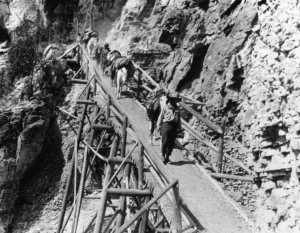
But no. Here before us rises an apparition. It is a dog, faithful forerunner of man. We look for the man that belongs to the dog, but instead find two little girls, one about fourteen years of age, the other twelve, out in search of the family cow. Both are bright eyed, both are nicely dressed and have snow white pinafores; both have neatly fitting shoes and the elder one has her little hands encased in elegant kid gloves. Half a mile on, we come to their house, a hut in the midst of a half- acre clearing, neat and clean in all its appointments, but looking as lonely as the wreck of a ship in the cannibal islands, and strange thoughts begin to stir in our minds about the why of such a living grove for beauty and the safety of two children alone in a forest wild.
After four hours steady riding, we brought up that day at the ranche (every kind of rural institution, except the cemeteries, is called a ranche in this country) where we were to camp for the night. It was owned by a Swede who allowed us, by grace of his slight acquaintance with our expert, to “put up” in his field and harvest the vegetable garden to the great joy of the cook.
It was credibly reported that the owner of the ranche was plotting matrimony, and hence the half shingled roof on the house. In the meantime, he and his men slept in a part of the stable, the horses occupied the other part, and we were given the open hay mow in com-mon with some other strangers who happened along for the night.
Dusk found us unpacking the horses and leading them to pasture; darkness found us groping for the pegs of the medium’s tent, making our beds in the dusty hay, and feeling cautiously around on the tablecloth at dinner for salt, spoon, knives, forks, or whatever else happened to be wanted. No use asking anybody else for anything that night. Every man had enough to do to look after his own things and keep his plate level enough to hold his mess.
You see, the tablecloth had been spread on the ground in the darkness, and it covered a clay model map of British Columbia with its fine ranges of mountains and intervening valleys. The consequence was that the meat would be found in the valley on one side of a knoll, the gravy in a valley on the other, and butter, mashed potatoes, mustard, milk, sugar bowls, pickle troughs, preserve dishes, etc., scattered around wherever ground was sufficiently level.
When a fellow wanted anything, he scooped out a place on which to lay his plate, and balanced it to see that it was all right. Next he began a stealthy and cautious exploration of the land of promise from the centre outward. When he rammed his fingers into the butter, if he was a clean man and a wise one, he wiped them on his shirt or on the tablecloth and said nothing, but if he was a fool, he gave vent to his feelings and got called down. The veteran used to wipe his on his pants and say nothing, but all were not so wise. Altogether it was a wonderful meal we had, but we decided that if an officer’s mess was anything like that one, we would unanimously beg to be spared the distinction of a part in it.
It was three weeks before we got the mashed potatoes and prepared mustard out of our hair, and we carried away so much of the Swede’s hay by the sheer force of adhesion, from our wallowing in it that night, that he was going to get out a writ of habeas corpus for the detention of all but the medium, unless settlement for damages was made forthwith.
Mineral Psychometry
Next morning the party set out to visit the claims in the vicinity owned by the Canadian-American Company. The veteran expert led the way, and his medium in her brief but charming Alpine costume brought up the rear, and so the procession wound up the hill.
Two leads were traced that morning by the medium who also stated that the lower lead might be found again across the creek to the south of the ranche on which we had camped the night before.
It may be stated here for the benefit of the uninitiated that in coming upon a lead, this lady instantly feels a magnetic or electric current run through her body from the soles of her feet to her brain. If the current is weak, that is, if the lead or the quantity of mineral in the rock is very small, nothing comes of it more than a tired feeling and depression accompanied by a weakness at the knees; but if the lead be highly mineralized, then in a few steps she is overpowered by the current, which, leaping upward from her feet to her, produces there such an inhibiting effect as draws back for the time being all motor activity, so that she is utterly unable to realize her own volitions and can only speak forth the words that appear as coming altogether from another personality. These words are in the form of a message, usually brief, but sometimes more extended. Ironically, they are coherent and never are they absurd….
On being removed from the ledge, she immediately recovers and feels little or no ill from the strange thrall that has bound her so completely.
On this particular day, we left her a trifle too long, so that power of speech was almost gone before we got her to a place of recovery, on a knoll apart from the ledge. During the trance she said in a small, weak voice, but with evident frustration, “Do you hear me?” but explained afterward that she thought she was 80 feet down in the rock and in consequence her message was being lost to us above.
That these phenomena are the manifestation of a gift, abnormal but real, would appear true for the following reasons:
1) In her own statement, Mrs. Anderson’s cerebral functions are partially inhibited while “reading” rock. Though she may endeavour ever so earnestly to keep it, all power of independent thought leaves her and she can think only concerning what is “given” her.
2) This phenomena cannot be evoked at will, but is dependent on certain external conditions, one of which is the presence of mineral in the rock. Rock without mineral produces no effect.
3) The currents are of varying strengths in different leads, and differ not only quantitatively, or in strength, but qualitatively, copper and lead producing sensations very different from gold, silver, or iron.
4) In her reading of rock there is no confusion, either respecting the kind of mineral contained or the nature and direction of the leads concerned.
5) Of the many tests thus far made, tests involving technical knowledge certainly not possessed by the medium, many have been verified and none have been falsified.
In the afternoon the horses were saddled and a trip was made to the claims on the lake. The lead on one of these was traced for upwards of two hundred yards when the current got too strong and the medium was obliged to desist. It was here foretold the discovery of a new mineral on the claim, a mineral used in the mechanical arts.
It was here also, by the way, that the Honourable Sec. got tired of walking down the steep hill and started rolling down. He might have been going yet had he not chanced to grasp the root of a big tree in passing and so was able to obey our “Down brake” whistle. He made good time, but the wear and tear on the rolling stock was so great that we concluded the good, old fashioned way of locomotion was good enough for us, and we came down by the path on foot.
Cascade City and Grand Forks
We arrived at Cascade City where a deputation visited the post office in search of mail. Failing to get any for most of the party, they laid hands on some string beans and new potatoes.
Learning that there would be no religious service of any kind on the following day, and in fact that such an event would be wholly a novelty, the Invalid offered his services for the occasion if the local people thought they could stand it. Being used to privations and hardship they said they thought they could. So dates were arranged for 11am and 7pm next day at the new school house, in which a service of any kind had never yet been held. The attendance at both services was good and the attention excellent but what further good was done, if any, the grand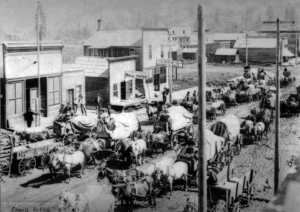 Husbandman only knows.
Husbandman only knows.
On our return to camp, judge of our satisfaction when we found that the Hon. Secretary Treasurer of the Co. and Mr. L. J. Smith had ridden over that day from Rossland, by the Dewdney Trail, a distance of forty miles, bearing the royal mail and with it the said intelligence of the tragic death of Rev. Alexander Grant, pastor of the First Winnipeg Baptist church.
Monday morning witnessed the departure of the mail couriers for Rossland.
We set to an expedition of the President, the Vet and the two Experts to view the Lalla Rook group of nineteen claims situated on a very steep hill about three or four miles from the town. Mr. Cameron, one of the interested parties, offered his services as a guide. The weather was warm as usual and the climb a very steep one, so steep that it seems still an open question whether Baldy, the Medium’s horse, may not come down again, however, they came down safely, which is the main thing.
While at the Algonquin property that day, the Medium read a bit of the rock from the Lalla Rook. The reading stated that it would assay as high as $700 to the ton. That is the kind of prophesy to get. And the reading of a bit of “float” pried up near Christina Lake read as follows. “I see related to a strong lead going through this whole mount. I will give from $40 up gradually to $200. Will go up and down. Will be found broken in these places by a convulsion in the rock, but will be found again. Not more than 60ft. from the water would be very easy to open.”
When the party returned to camp they did not have to be asked twice to have a seat for all were very tired. After dinner had been served, Billy mounted his horse to hunt up a man to whom he had lent a horse some time before, a good horse which the villain had forgotten to return. In case he should be obliged to argue the matter with him, he borrowed a revolver to be chief pleader in the case. However, as the weapon never by any chance hit anything at which it was pointed, no one felt very uneasy about consequences.
Billy’s absence that night gave the expedition an opportunity to hold a little séance. The medium did not go into a trance but was clairvoyant; she said, “Seer tells; there a cabin rises up and a sawmill, a small one. I see gray horses, heavy ones, at work going round and round. I see a small town and people coming to it in numbers. I see places mining a free milling ore and copper in a big mountain. Behind the mountain and some distance from it rises a tall peak and I am convinced that from that peak we can see the ocean. We can at least see some large body of water.”
The evening of Thursday, Aug. 10, found us in Grand Forks, a distance of 13 miles from Cascade City. Both places are mining towns, but the latter by reason of its beautiful waterfall will no doubt attract many tourists. The water power is immense and someday its energy will light the houses and mines in the vicinity as well as drive a trolley car down to Christina Lake, in the days when that place becomes known as the summer resort of West Kootenay.
Grand Forks, situated at the forks of the Kettle River, has most room for growth and has some good mining propositions, places of production scattered about in the near vicinity. It is a town (two towns in fact) having about 800 or 1000 people, while Cascade City has only about 150. Both places expect to see the Crow’s Nest Pass railway running to their gates and on to Vancouver and each hopes to be the chief centre of the mining industry in those parts.
The ride from Cascade City was made without incident. The day again was sweltering and the dust, fetlock deep in the road, was kicked up in clouds by our horses, to our sore discomfort. There were only two events of interest that morning. One was the killing of a long and ambitious snake that had crawled up on the fence to see the procession pass. Second was the finding of a nice farm, well kept, well-watered, and well husbanded. Thunder! How refreshing it was to see tilled fields and a real live apple tree with apples on it. We had not seen anything like a farm since entering the mountains and found grain and hay worth from $30 to $60 a ton in Cascade City. It really costs more to feed a horse than a man here.
At Grand Forks the party camped from noon till the next morning, partly in order to work off our armour of dust and partly in order to see the faces of two old Portage La Prairie friends, Mr. Chastlay and Mr. Neil McCallum. They, on their part, seemed right glad to meet old friends again and showed some curiosity over the unique feature of our expedition: a lady prospector.
They sent over by the President two samples of rock which they desired her to read. One was from the Seattle mine and read as follows: “This is a branch lead. It will join a strong lead about 60 feet down, and then will give in gold about $180 and higher the farther you go.”
No. 2 was from the English and French mine and read thus: “We are showing strong sign far ahead in the lead direction this one is taken from. Will soon join a very large lead. Will find this one on a sill only a few feet from where you are.”
In the evening we looked over from our camp to the town and with deep emotion viewed the quiet beauty of the scene as the chaste moonlight shimmered on the banks of the pines and on the noble mountains to the north of the town. The evening was so inviting after the hot day that the Veteran and Billy went uptown leaving the rest of us to scrape up wood for a camp fire and spin yarns. Some interesting stories taken from real life were told that night, for there is no life, as Dr. Oliver Wendell Holmes says, but that, that has enough material for one good book in it, if all were told.
In the present instance, the leaves from the Expert’s book were raided for the juiciness of the telling. He did not spend thirty years of his life on the American border for nothing.
Grand Forks to Camp McKinney
Cheered by our rest of the day before, we made an early start next morning, travelling in a south westerly direction through a beautiful farming valley which opens its gate on the Valley. Then we saw some large fields white unto the harvest. Pleasant oasis indeed, they seemed, in the vast desert of mountains. As we travelled up the valley, farther and farther into the jaws of the converging hills, the farms got smaller and smaller, and steeper and steeper, till the last one really amounted to a puzzle in agriculture. How the horses ever ploughed that hill without sliding down on their lunkers, or how they ever climbed it without holding on by their teeth; or went sideways without rolling down and bringing the plough after them, is more than any of the party could explain.
This day, we made sixteen miles and were beginning to entertain rainbow hopes of reaching Greenwood City by nightfall, when Court, feeling his infirmities too many for him, refused to go another step with his pack. So we went into camp forthwith, glad to think that for once Court was not playing the hypocrite.
On resuming our journey we took the trail leading to the right as the President was anxious to reach Greenwood City by way of the Golden Crown properties in which Mr. Anderson Kelly and other Brandon people were interested. In order to make sure of it, he enquired the way of a resident chopping wood by the road side. The resident told him to take the trail he had just forsaken. He did so and in course of time reached Anaconda mine, instead of Greenwood, having gone directly out of his course by following the directions of an inspired ass who leaked more information than he held. He resolved to follow his own impressions next time.
It was 8:30 am when we landed in Anaconda in the heart of the Boundary Creek mining country. As there was some buying to be done here, we went into camp till after lunch. The President meanwhile rode off to Greenwood City in hope of seeing some of the Golden Crown people from the east. There he met Mr. MacFarland of Portage la Prairie doing a good business, and also Mr. Neil Laurond of Brandon. Neil, like a good friend, got astride a horse and came down to see us when he learned where we were. He was like to weep for joy at seeing an old Brandon face after his burial in the hills all summer. We were right down glad to see him too and filled him as full of lunch as he would hold.
Greenwood City numbers about 250 souls and its rival Anaconda about 150.
Things may come to pass yet with Anaconda. At the present time it has a hotel, a large one for such a small place and one wondered how the keeper made the place pay for a candle, but the mystery was presently solved on riding by. The south half of the lot was covered with a fearful pile of whiskey and beer bottles, stacked up like cordwood. Evidently the miners had built the hotel out of their hard-earned wages while they themselves live in “shake” covered cabins in the hills.
During the afternoon of the 12th, we made Midway, the prettiest natural site for a town in all that part. The valley is long and wider than usual; the Kettle River runs by its doors and the mountains on either side are commandingly high. At the present time the soil is so arid as to render it useless, but a little irrigation would soon fix that and cause the surrounding hillsides and valley to blossom as the rest. There is abundant room for growth and little doubt but that the few will become a thousand and more. Here we found Mr. Arthur Unsworth, formerly of Portage la Prairie, vegetating in bachelor pride and loneliness but doing a good business nevertheless.
We went into camp across the river and next morning got a good start on our way up the valley, but made only nine and one half miles.
Nothing disturbed the placidity of our consciousness except an animated query as to how some of these poor farmers ever manage to keep soul and body together. The hills seemed too bald to keep even a sheep alive, but here their vegetation might be under cultivation by artificial irrigation.
Saturday, the 14th of August, found us at Camp McKinney, after a long climb by trail through a magnificent stretch of forest and by a dirt wagon road for the last mile or less. The camp itself was a hairy looking place in the forested top of a considerable mountain, noted chiefly at the present time for its Cariboo mine, a free milling concern which grinds out $16,000 of ore for its owners each month, above all running expenses.
We went through the town and camped two miles on the other side. When within two miles of the place, Court played out again. In the goodness of his heart, the Vet, who had done twice before, relieved him of his heavy pack and used him as his saddle horse, walking up the hills himself whenever the road was steep. Court presently refused to pack even his own saddle so he was relieved of its weight and both riders came on afoot till the procession was regained.
At Camp McKinney, the chaplain of the party, learning that religious services were few and far between, announced himself for the following evening at seven o’clock, provided a hall could be found for the service. When the appointed time came he was given the dining room of the hotel, a Mormon Bible and the bar tender as master of ceremonies. Between 30 and 40 people attended and they listened with deep attention to the old, old story. They then gave on the conclusion of the service, a cordial invitation to the chaplain to come again.
While here the Medium read some rock for the postmaster’s wife who had shown herself very sociable. In the reading the statement was made, that the lead would be broken but would be found again about 50 ft. away. The prediction we were destined to find verified before our trip was over.
Camp McKinney to Keremeos
On Monday the 16th, we set out for Fairview, twenty-six miles distant. We made a long march of 22 miles that day landing at Innikip in the Okanagan Valley in the afternoon. On the way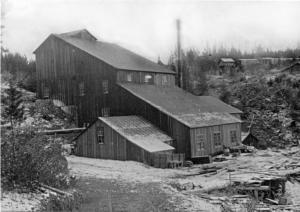 down the divide we gathered in eight grouse and two rattlesnakes. Our camp for the night fell near an Indian village that had been a Hudson Bay post a generation before (Osoyoos) but was now fallen entirely into the hands of the local Indians, a tribe of red men, more broad of feature, more thick set in stature and more intelligent than our own Manitoba Indians. The women of the company were cheerfully engaged in washing buckskin gloves and gossiping when we came up, while there sat in the shade of his hut at a little distance, a wizened up, carved and wrinkled effigy of the male that was designed for old Ayesha, the witch, in Rider Haggard’s tale.(“She” 1886) He had dispensed with the formality of a shirt, and was religiously endeavouring to eat his bite and keep cool at the high time. He was deaf as a post and over a century old, a woman informed us who came up at this moment, dragging the winter’s firewood after her.
down the divide we gathered in eight grouse and two rattlesnakes. Our camp for the night fell near an Indian village that had been a Hudson Bay post a generation before (Osoyoos) but was now fallen entirely into the hands of the local Indians, a tribe of red men, more broad of feature, more thick set in stature and more intelligent than our own Manitoba Indians. The women of the company were cheerfully engaged in washing buckskin gloves and gossiping when we came up, while there sat in the shade of his hut at a little distance, a wizened up, carved and wrinkled effigy of the male that was designed for old Ayesha, the witch, in Rider Haggard’s tale.(“She” 1886) He had dispensed with the formality of a shirt, and was religiously endeavouring to eat his bite and keep cool at the high time. He was deaf as a post and over a century old, a woman informed us who came up at this moment, dragging the winter’s firewood after her.
We cast envious eyes on a green field nearby, but the Indians would not allow us to enter therein because of our horses. We made shift to camp near an adjoining field however, and managed to feed our animals on hay that cost $1.25 per hundred pounds. As might be expected, we needed no urging to get out of a place like that and 7:30 the next morning found us in our saddles and heading for Fairview across the south end of the Okanagan Valley as it lies in Canada. Oh! But the day was hot. Nevertheless we climbed four miles beyond the town before going into camp. It was 110 in the shade that day and about 370 in the sun where we were, making one of the very hottest times we had on our trip.
Fairview is a mining camp coming more and more into prominence on account of its surrounding wealth of free milling quartz. Most prominent among its mining concerns is the Tin Horn, mined chiefly by Messrs. Dyer, Davidson and Russell. Two other claims, the Stem Winder and the Smuggler, are also of importance, the latter having a stamp mill of several stamps running on its own ore and that of some other less developed properties. Ore of the latter lying by our trail presented the spectacle of a hole in the ground, a sort of open excavation such as might be made for some large building, but from it the owners had taken $60,000. Unfortunately that was all they could find as their lead “pinched out” as the miners say.
The town of Fairview is not inappropriately named, for it looks out on a prospect as desolate as one could well find outside of the Sahara desert. Nevertheless the view is all fenced in by 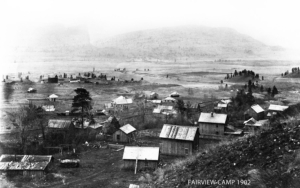 ranchers, whose cattle manage to pick up a living by working faithfully on day and night shifts. If the valley were only irrigated it could look like a paradise.
ranchers, whose cattle manage to pick up a living by working faithfully on day and night shifts. If the valley were only irrigated it could look like a paradise.
The town itself is very circumscribed. It is situated in a gulch opening out on the lowest bench of the mountain. The town site not only covers the bench but stretches away up the gulch.
It reminds one of a mathematical line as length without breadth, only that it caused to “lie evenly between its extreme points.” Think of a town consisting chiefly of one street two miles long and one to three hundred feet in width. Such is Fairview, and when the midsummer sun catches the traveler in that gulch and pours down his angry beams upon him in one flood of etheric fire, he presently begins to find himself melting away on his horse like so much drawn butter.
We found several prospectors at work here, scouring the hills for gold, and so excellent were the signs in the rock that the Expert wished to end the journey at once and devote the remainder of the summer to prospect work in that vicinity in preference to going further on into an utterly unknown region.
But this could not be; so another horse was procured at a cost of $15 and given to the Medium to ride. He was a bay in color, vague and unprincipled and as lazy a horse as ever stepped. The Medium unfortunately encouraged him in his idle habits, but we forgave him much for his care in carrying her, and made amends for the balance when we set out alone.
We could ill spare the time but were obliged to remain here a day and a half to give our sick and jaded horses a rest. While we rested we had a few glimpses into the occult. The Expert had a little reading from the Medium in which he was told that he would carry back with him more gold than he ever had in his life. Rosebud informed the Vet that we would need two new horses before our trip was ended and she informed the President that the Invalid had a book in his soul and was gathering material for it though he knew it not.
On the 17th the Medium said she had been clairvoyant and saw a swamp through which we would have to pass. It seemed about 25 miles in length but she could not tell exactly. She saw considerable hardship, chiefly in getting feed and water for the horses. She saw also a narrow escape from fire but that all would be forgotten when the promised land was reached.
On the morning of the 19th, we resumed our march, though the horses were still far from well. Some of them were indeed destined to succumb to the mysterious malady that so quickly depleted their strength and hindered our progress, but the risk had to be taken and the price paid, for the hours were precious.
Accordingly we plumed our feathers for a flight over the range and down into the valley of the Similkameen. It was a stiff climb and an endless descent. Bench after bench we passed going down, saying each time of the one just ahead, now we are there. “Don’t you see the valley is just at the foot of the next incline?” We saw the valley there, surely enough, but when we got to the edge of the bank and looked over, it had a path to the foot of another bench. It played this trick half a dozen times or more on us until we thought we must be on the way down to perdition. Finally, when we had travelled over an hour without coming to another precipice, a theory was advanced that we were not on a bench at all but had been mysteriously transported into the valley. This theory was confirmed by our arrival in the afternoon at a ranch, store and post office known as Keremeos.
A Midnight Alarm and a Scandal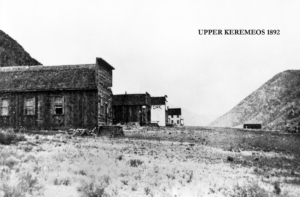
As there was nothing outside the fence at Keremeos we obtained permission to camp in the hay meadow and turn our horses loose there. Some of the party went up to camp in the orchard but, finding the fruit was not yet ripe, came away again. Said it was healthier camping in a hay meadow anyway.
The meadow was a paradise to the horses that had been quite ill for some time on the fine grass or no grass of the hills, and the haystack proved a couch of eiderdown to our backs not yet immured to a bed of pine or fir boughs. A bough bed is all right – when you get used to it, if you do not die of running bed sores in the tempering process.
That night we slept under the open sky a few yards distant from the Medium’s tent. The day had been warm, the hay still continued to be warm and the grasshoppers were legion. But it was not wonderful when one of these troublesome insects got into the President’s bed by mistake, nor anything wonderful that once there, should he suddenly attain to some importance. The President had just tilted his head back for the opening overture of his nocturnal solo, when the grasshopper reached for the bare foot of his victim. It was too much for him and he rolled back dead – poisoned; but his enemy didn’t die. He gave a whoop and a jump of surprising bounds for a man of his years and yelled, “Snakes in the bed,” so you could hear him in Fairview. The Invalid, disturbed by the racket, said, with some irritation, “Go on. It’s only a grasshopper,” and rolled over on his side to go to sleep again.
Later in the night, the Invalid says he rolled over and found the bed was empty. On taking observations he found the President standing on one hind leg and stretching the other to its utmost limit, giving out most distressing grunts the while. Sleepily he rubbed his eyes and watched the pantomime with bewildered interest. “Why should the President take to gymnastics? Why should he take to them at such an unchristian hour? Why should he be doing it there in the moonlight in such scant attire?” Just at this point the President turned and saw him looking on. “What in thunder are you gawking at there?” he roared, in a voice that roused the camp. “Get up here and pull my leg and be quick about it too.” Evidently he had dislocated a limb in his gymnastics or been bitten by a serpent after all. Anyway, seeing that the times were perilous, the Invalid thought it wise to do the pulling first and the philosophizing afterward, so he got up and felt around for wounds, bruises and putrefying sores, but none could be found wherever. The trouble was only a cramp in the leg which a little judicious massage speedily relieved as effectively as it relieved all doubts as to the reliability of the President’s intellectual steering gear. The fellows in the other bed, seeing that all danger was past, made a few ironical remarks and settled themselves down to rest again, in which they were presently joined by the President whose trumpet blasts began to peal far and wide the intelligence that “a friend in knead is a friend indeed.”
During the early part of the evening, Sam (spectre) came to have a chat with the party. He was warned to be careful of his tones for Billy, who was also very anxious to know what was going on, was lying, the President said, with one ear over a fence nail not far away picking up information. He had the longest ears of any in the party.
When Sam had duly absorbed this advice he went on in a lower tone, “That fellow in Vernon (Judge Spinks) is a sneak. He profited by my suggestion respecting placer mining on the north fork of the Kettle near Grand Forks and has failed to give me credit for it. He stands to make thousands but let him beware lest he lose it again.”
Sam also said, “Everything is going well with you people,” and in response to a query as to the road, he said, “You will know where the place to turn off is when you come to it.”
Our stay at Keremeos was a very pleasant one. The post office, store and ranche are owned and operated single handed by an intelligent lady, Mrs. Daly, a woman of stout heart, cheerful manners and good executive ability. On her ranche she had a garden, an orchard and six hundred head of cattle for whom hay had to be provided each year. Besides this she managed a household of seven children, three of them her own bairns and four belonging to a deceased relation.
She was three miles from the nearest neighbor and had all her farm work done by Indians of whose kindness and faithfulness she spoke in very high terms. Her husband had been taken away just the year before, leaving her to grapple with the business and household cares alone, and she had risen to the occasion with praiseworthy courage and address. Mrs. Daly was also kind hearted and attractive and this will perhaps explain why the President, the Expert, the Vet, and the Cook even, made so many pilgrimages to the house that day. Nothing else will. They went up for water, for vegetables, for milk, for everything and for nothing. Billy went up for a monkey wrench tool for which he had about as much use for as a razor-back hog has for two tails. When he got there he found the Expert and the Vet in the garden scrapping over the privilege of digging the widow’s potatoes. Seeing he was too late on that score, Billy slunk away through the orchard, only to find the President there in a tree privately observing the garden and the house. This looked like a very “low down” trick to steal the kind widow’s apples, but it transpired that he was not stealing them but only plucking them for the sake of another excuse to get back to the house.
The next morning the President went on ahead half an hour early, to settle the expedition’s bill with Mrs. Daly. Long afterward when the cavalcade filed through the gate in the rear of the house it was necessary to detach one of the party to fetch him away.
Finally by the help of frantic gesticulations and some heavy threats of trouble to come, he got the chief around the corner of the house where longing glances backward could avail no more. Here a new trouble presented itself, the Expert and the Medium had disappeared with all the pack horses, tents and provisions. This left Billy and the Vet to wonder what had happened.
After a desperate chase the pair were discovered and overhauled, the Medium hounding the four pack horses as they went. They were duly brought to bear before the President, whose heart still tender from recollections of the scene on the verandah, forgave them much, and only a lame verdict could be obtained. Notwithstanding the seriousness of the offence, the culprits were allowed off with a warning not to let it occur again.
In the Samilkameen Valley
Friday the 20th of August, witnessed an early start westward ho! Up the arid valley of the Samilkameen. The shades of night found the party in camp near an Indian’s ranch, to Billy’s intense satisfaction. Here were some Indian women to whom he might display his linguistic accomplishments and his irresistible charms of manner. The party too, were in good humour and, as they lay in the tent and looked out on the silver moonlight, they wandered off into reminiscences of the past.
The Vet began to tell a dream of how he had gone to evening parties, only to find when he got there, that he had forgot his shoes and stockings.
The Expert, not to be outdone, said he had found himself in other days dreaming about wandering at picnics and fully enjoying the hour amid the assembly of gaily dressed people, but invariably when he looked down the blood froze in his veins as he discovered that he had come away forgetting certain articles of apparel, the most indispensable to the completeness of a gentleman’s wardrobe.
The President was about to come in here with necessary majority – as usual when the party protested that they had had enough, and looking around, discovered that the Medium had slipped quietly out and gone to her rest, which worthy example it was moved, seconded and carried that we all proceed to emulate without further delay.
The following day was Saturday; a day much to our liking in those times for we knew the rest day followed it. During its course we travelled still in the Samilkameen Valley, but looking now for the turning off place.
During the forenoon, the Medium evinced an ever deepening depression. At noon it overpowered her and she slept heavily for half an hour. On analyzing her feelings she said she believed it to be due to a quickening sense of her responsibilities in the case. Up to this, thrice she had felt herself a kind of useless appendage to the procession, but now was drawing on the dread hour which must mark a crisis in her life. She must vindicate this as the most unique and important test of her powers ever made, and prove them valuable. At the same time demonstrating her integrity of purpose triumphant, or leave her open to the charge of being an adventuress and a charlatan. Her case she felt, was considerably like that of a rebellion – justifiable only if successful.
At about four o’clock in the afternoon the Medium was seized with an irresistible desire to ride on ahead, so, putting spurs to her horse, she galloped to the front, followed by the Vet, who happened to be riding beside her. This was something new as she had never shown herself ambitious of such a distinction before. For half an hour or more she led the procession and then came back. On the way she met the Expert, who had come up to the front, his horse and the President’s being the best walkers in the band. On meeting the Expert, she pointed out a certain mountain, and said, “If there is a stream running by that peak, jutting out into the valley ahead of us, it is the place at which we must turn off, and we must follow the creek up to its course.”
The creek was found in due course coming out by the foot of the mountain. Five Mile Creek it is called, because it is that distance from Princeton, a mining camp up the valley. On the banks of this stream we pitched our camp till the following Tuesday, Sunday being spent in rest and Monday in laying in a stock of provisions preparatory to our plunge into the wilderness.
While resting here at the mouth of Five Mile Creek, the Medium one evening reached down into the chambers of memory and produced a tale that to one at least of the party was of striking interest. She stated that about the 15th of December, 1896, she had been clairvoyant one day when just able to sit up in bed, and saw a mountain with herself upon it and also the corpse of a man. As she gazed at the corpse, three men came and stood beside it. The dead man had nuggets of gold tied up in an old handkerchief and a slip of paper on which was written that he had more nuggets which he had been forced to abandon through weakness. She asked how long it was since this had happened and was informed that it was about fifteen years previously.
In her vision she tracked back also to the place where the nuggets were and found them covered with green moss. She saw herself gather up as many of these nuggets as she could carry away in the striped apron she had on at the time, and was conscious of a fear that the apron would give way with the weight. The place where they were found was on a mountainside, near the foot of it, the view opening out onto low land.
As the Medium progressed, the Vet sat with his mouth open taking it all in with breathless interest. On being challenged about it he informed us that for all he knew, the Medium was describing the death of his own maternal uncle, a Mr. Campbell, who had perished in these very mountains about the time stated, while out prospecting. The information struck us as being a very singular coincidence.
On Sunday, Rosebud chatted with the Vet and said she saw us this week bending over and picking up something by a creek which gave us all great delight. Sunday passed quietly in camp, broken only by threat of a deluge from a wayward rivulet that had burst its banks on the bench above us. The hydraulic genius of the Expert saved us from being flooded out, by throwing, like Hercules of old, the river from its course.
The Fringe of the Wilderness
On Tuesday morning, bright and early we girded up our loins and the corsets of the pack horses on the fringe of the wilderness into which we were turning, and with hearts full of mingled hopes and fears prepared to grapple with our fate. Travelling for pleasure was about over and the hour to do business was upon us. There was nothing for it however, but to labour and to wait.
A bridle path leading to the Catholic Mission on Okanagan Lake (Brigade Trail), led us at the start. The first three miles of it were leery enough in places and once we took council of discretion and dismounted for the sake of the life insurance companies represented. On the way up the creek, the Medium pointed out various rocks which she said she had seen before, though not with mortal eye, and stones in the creek bed which had been for years as familiar faces to her.
By noon we found the gorge widen out into a very fine valley and night found us camped in a natural park. The night air was cool, too cool for the comfort of the Invalid, who buttoned up his blouse and growled to himself about the bloomin’ country, but the President said it just suited him exactly.
The parkland here rises through ten miles or so of country along Five Mile Creek, at the source of which lie a chain of lakes known as Link Lakes. (Just west of Osprey Lake) These lakes are quite small and extend to the western post of Front Creek divide. The whole chain would not be more than seven miles in length.
In these lakes we had some good sport with rod and line and enjoyed it over again later on at the table. The Medium recognized nothing in the landscape at first but on going for a walk, found a new point of view as some familiar features came into sight, notably the mountain on the S.E. corner of the first lake, a hill which she was anxious to climb but was denied through weariness. In her visions, the valley was entered from the north east.
But as the Medium could not climb the hill, the President and the Expert could and they did; leaving the Invalid to stand as a guardian dragon over the Medium in their absence.
During their absence the Medium related some of her own personal experiences previously had. Among the things she said: “It was in August, 1894, I first saw this country while I and my family were camped with the President and his family at Shoal Lake, Manitoba. I heard a voice, as I saw it, saying, ‘This is for you people. You will have immense wealth’.”
“I again saw this country in July, 1896. I was at the time lying seriously ill in Grand Forks, North Dakota. I saw Mr. J.M. Robinson standing at the foot of a ledge of fine milling ore, and myself at the top of it with a number of men, strangers to me. This view was so persistent that when my food was brought me by the nurse, I could not see it for the hills, to her great alarm. I was also clairaudient and heard said, ‘This is for Mr. Robinson, tell him so,’ but I did not know when I should see him and did not care to write, and so said nothing about it.”
“At that time I had not thought of the west, but firmly purposed to settle on my homestead three miles from Perth, N.D. At the time I was very much annoyed at the persistency of the vision, when, so far as I could see, it contained nothing relating to my own affairs.”
In the light of subsequent events it is interesting to remember that this statement was written down on Aug. 28.
The next day Reban got his oar in. He said, “You people are coming into your own. Do not worry about anything. Your progress has been fast enough as you will see later. You cannot see too much of this country as great responsibilities will get rest upon you which will cause you to be interested in it. In a few days you will come into it, and in a few hours you will see the mountain. We will speak with you often then. Another bard of whom the (African American) is one, will speak to you. You will meet difficulties but you will be strong to meet them and hopeful. It is given you on this planet and will last you your life time. In a few years this country will be covered with roads and will be known throughout the world. Copper mines not yet discovered will be worked for years and gold will be found where people have been walking to and fro. The land will be a blessed one to many who have been unfortunate elsewhere. We will lead you to it, where the foot of a white man has never trodden.”
In the afternoon he came back to the President and read him a lecture on the folly of worrying. This was after his return from the hill on which nothing was found except granite and worthless “bull” quartz. He said, as reported by the President, “My son, you are bringing on you old conditions of worry. Take things easy; everything is going all right. You do well to come up this valley and to examine this mountain. The day will come when you will be glad to know that you did it. Only, do not worry. You see the Medium does not worry. You see how care-free she is and it is because we take it all away from her.”
THE SEARCH FOR THE KATHLEEN
Pulling out in the afternoon we camped for the night on the N.E. corner of the third lake and early next day reached Trout Creek across the divide. This fine stream, after running west and SW around the foot of Bald Mountain, turns and flows eastward, emptying into Okanagan Lake about 23 miles from the divide. This creek the Medium recognized and said our course would take us from the trail here and northward through the wilderness.
The President’s impressions were strongly in the same direction, as, after luncheon, himself, the Medium and the Vet set out on foot through the forest to see what might be seen. They returned in the evening and reported having climbed the hill and discovered a bald peak some miles ahead, where the Medium recognized and with which the President was strongly impressed. This peak was afterward named Bald Mountain and the view just mentioned was obtained within 24 hours according to Reban.
On the hillside the Ni**** came for the first time and with difficulty: It seems he professes to have been a prospector in earth life. His first word was “Victory!” as he twanged an imaginary banjo and kept time with one foot. Then he said, “You are on the right road, and not far from your own. It lies over that mountain before you. I am glad to be able to be of service now. You will have great wealth an’ enough for all. I can’t talk much longer, so good bye.”
THE BORDER OF THE PROMISED LAND
Saturday, August 28: The camp remained at Trout Creek while the President, the Vet, the Medium, and the Expert with the Invalid set out into the trackless wilderness on their way toward the bald peak seen the day before, and another clairvoyant vision oft seen by the Medium, had its fulfillment; she was riding through the forest with four men, one of whom was chipping the trees with an axe as he passed by them. This vision she had years before, was literally fulfilled as we filed through the forest, the expert blazing the trees as he went in order that we might find the way back to camp again without difficulty.
On the south side of the bald peak referred to, there runs a small stream of very cold water emptying westward into Trout Creek. This creek we called Progress Creek and sat down on its bank to eat our cold luncheon.
After lunch, the Medium becoming clairvoyant said, “I see a tunnel in a mountain, near the foot of it, with free milling ore and quartz on the dump. I see a big brown and a big grey horse working on a kind of milling shaft. There seems to be work with timber going on at the same time also.”
Her utterance was suddenly broken by a loud cry for help, after which she rapidly sank into a condition of lethargy from which she was presently aroused by the President calling her and giving her a gentle shake.
In a few minutes the Medium was herself again and we mounted our horses and set out to climb the hill before us, now known to fame as Bald Mountain.
We had now been thirty days on our trip and as yet we had no sign of that good fortune which was to befall our expedition. It seemed as hopelessly far from it as when we started. And indeed farther as revealed to the practiced eyes of the Expert, with no change in the formation of the rocks; just the same old granite, chill and grey. The suspense deepened with the conviction of the experienced mining man, thinking that he was out with a party of visionary tenderfeet to the great loss of a summer’s stake. The thought began to grow unpleasantly vivid.
The controls had told us we were on the borders of the promised land; if their words were false, what then? No one liked to think of this, the President and the Medium least of all. Still, “facts are stubborn things” and the barren country rock on every hand boded ill events for the tenderest of the tenderfeet in the party.
At length it appeared. Hardly dared we to hope the dark stain we saw was the blessed iron capping, blessed harbinger of better things near at hand. In silence we followed the old hill climber, each afraid to voice his thoughts that here or there he had seen an iron capping, lest the Expert should reply again, “It’s only worthless cyanate”, and another wish would fall in ruins.
At length, after a painful climb, painful more in the tension on the mind than the strain on the body, the party with agreeable emotions saw the Expert deliberately stop, dismount and pick up a piece of rock to examine it. The President said, “This looks like iron capping. The Expert said, “Yes, it looks very like it,” and then we all felt free to express an opinion. We had all thought that was iron capping for twenty minutes back.
But it is one thing to find some iron capping and another thing to find a mineral ledge that is of commercial value, so we cast about us to see if there might not be a ledge in the vicinity. Fifty feet away the President walked onto it. He called the Expert and asked him to examine the chip he had broken off. After some scrutiny the latter said, “Yes this is good iron capping and below us is a ledge and he proceeded to prospect the ledge for himself in order to make assurance doubly sure.
What did we do? What could we do? The President just sat there and grinned a great, broad grin of relief and the others looked on for a time or went on chipping more rock from its bed in an idle and aimless sort of way. Finally one of them, clearly feeling that the occasion demanded some kind of celebration, proposed a cheer. Immediately three hats were raked off for an airing and three cheers went up with such astonishing vigour as made the Medium look up from below and the Expert look down from above with a chill of fear that we had suddenly gone daft.
Then the President, coming within shouting distance of the Medium, explained that we had found a real, true lead, the Expert’s word for it, and that everything was now all right.
Whereupon what did she do? Thereupon, what could the poor girl do? Being a woman she couldn’t cheer, for she wouldn’t know how to go about it. And if she did know how to go about it, the cheer would have died before she could get her hat off; and on the other hand, it is certainly a physical impossibility to give a British cheer with one’s hat on, so what could she do? As was revealed before, she did what any other woman in the world who is a woman, would have done under the circumstances, she sat down and wept.
When the weep was over, we all climbed into our saddles and continued our climb in an effort to reach the top of the mountain and have a look beyond. On the way we came across a very steep ravine. Tying our horses at its brink we descended and climbed the other side. The President then pushed on toward the top of the hill, the Expert went prospecting by himself, and the Vet, the Invalid and the Medium took their own course in leisurely fashion toward the summit.
On the rise near the top, the Medium leaning on the arm of the Invalid suddenly remarked, “I feel a lead here. There is a powerful current. I cannot remain on it, it is so strong. Let us cross over it here and sit down.” Which thing they did. The Vet at this cocked up his ears and pushed on toward the top. Presently the expert came up, walking on the lead. “The Medium says there is a lead right there that she felt a powerful current from it. What do you think of it?” he remarked to the Invalid.
“I do not think much of it,” he replied. ‘There is some quartz here and porphyry but it has a hungry look. I don’t think it is worth much.
The Medium said nothing.
When the President and the Vet returned to where we were, it was decided to let the Vet and the Expert cross the hill in search of more signs while we went around after the horses and joined them on the bench below.
Now, down the ravine there cropped out some whitish looking rock. As the Veteran was heading down that way in the lead, the Expert requested them to fetch a sample of this rock. This he was forced to do, but at that time, not knowing good rock from bad, he picked up a worthless bit of porphyry and granite which the Expert threw aside as worthless as soon as he saw it and dismissed forthwith the white showing from his mind. By such a mischance was the splendid Kathleen ledge “turned down” as worthless.
As the day was now far spent and we were three or four miles from home, the signal for retreat was given and we made away with lighter hearts than when we came, the Medium declaring that she had felt the currents from four different leads that day.
Arrived at camp and found that Billy had gone out with the shotgun and found a young fawn. He said he had shot it at 80 yards and had packed it home on his back three miles.
At the same time the President proudly produced a rabbit which he affirmed he had killed with his revolver. This explanation not being taken at its face value, a lively discussion sprang up concerning the presence of the rabbit’s carcass, which no one could dispute. The following theories were advanced to account for it.
1)That his horse stepped on it and killed it.
2)That he stepped on it himself accidentally while it was sleeping in the brush, and then kicked it to death, or that he ran it down and clubbed it.
3)That the rabbit died of fright when it saw him and his gun and then he shot it.
4)That he found it dead and then shot it.
5)That the Expert shot it and gave it to him under an unwritten bond of silence.
Sunday, Aug. 29 was spent quietly as usual in camp, though at one time a general row was narrowly averted at the table.
It seems that when Billy got the dinner ready he began to bray like an ass and the imitation was so good that the Vet and the Invalid responded at once on a run. Some untimely remarks having been made concerning affinities and blood being thicker than water, a serious trouble was about to ensue, a trouble which was however, happily cut short by the cook shouting in a commanding tone that the dinner was getting cold. A threat like that was enough to quiet any dispute in those days, and on this particular occasion it was more than enough for the roast venison had an excellent smell and it was the only smell of that kind we had had for a month.
In the evening a song service was held in the communal tent, after which the Medium retired for a short walk in the open air. In a very few minutes she bulged into view again in the tent door on a run, her face and manner betraying very evident symptoms of agitation. She accused the Invalid of trying to play a practical joke on her, and on his vehemently protesting his innocence, she explained that someone in the darkness had seized her by one arm and the opposite shoulder with a vicious clasp in the darkness. As none of the party had in the interim been out of the communal tent, suspicion at once fastened itself on Billy as the only possibility left, but on the Vet going over to his tent he was found to be safely in bed.
It was suggested that the controls give us some light on the subject. Reban came and said, “It was that Indian, the Medicine Man. He is revengeful, and because he cannot manage the Medium he is desirous of playing tricks on her. We will however, see that it does not occur again. I am glad to see for tonight you are on the right road. I cannot speak further to you as my Medium is disturbed, but will say I have no cause to be ashamed of her work, and will talk further with you tomorrow.
ENTERING THE PROMISED LAND
Next day, Aug. 30, the camp set out for Bald Mountain. It was a tedious ride through the virgin forest and over scattered logs lying in profusion on the ground, but by one o’clock we had reached Progress Creek at the foot of the hill and there we drove down our stakes for the time being.
At noon Reban came to the President. He said, as reported by the President, “I told you I would bring you into the very heart of the wilderness. Are you not there now? They who have lived in this country always tell me the God of a white man, even a hunter, has never crossed this side of the mountain where you are, but only Indians.”
“Now for business. Prospect well this side of the mountain before you and the other side, rejecting afterward what you do not need. You will find a lake ahead of you as has been said, and a mountain beyond this one which you must cross before you leave the country. You are at the thin end just now, but never mind that. Prospect everything thoroughly. I have many things to say to you but cannot now. That man’s atmosphere (Billy’s) is rotten. It is like a flame of fire. I must get out of it.”
The great problem now before us was not the prospecting of the mountain in our path but the finding of a practical route over or around it, to something more promising beyond, possibly the lakes and mountain seen by the Medium in her vision recorded in February 1897. To this end the President set out after dinner by way of Trout Creek, while the Expert and the Vet went over the hill to see what might be seen. The Invalid was decided for guard duties.
At four o’clock they all came back bluer than the blue skies above us. The President reported his route as being very difficult and the other two condemned the mountain as worthless, so far as mineral claims were concerned.
The Expert said that on second examination the leads did not look so well; they might possibly be worth one dollar a ton or so, which would be only a small fraction of the cost of mining and reducing the ore.
As a consequence of this every man in camp had a lip on him like a Georgia mule, and all were more or less indignant toward the controls. And there was some reason for this, for if their word was found to break down this early in the game and to be devoid of content, what guarantee could be had for the other and larger assertions concerning what they said in future. Other excuses could be made to mask failures, and so on indefinitely.
It was decided to “hold up” the controls and ask them to please rise and explain. Sam came in due time and said, “I am here to face the music. I do not have to take back anything I have said. Ask any questions you please and I will answer them if I can.”
On being questioned as to the best route to take, he said he did not know which way was the better, up the creek or over the mountain, but he would go over both and report in twelve hours. He said, “You are not far from the place. I cannot tell how far exactly for we travel through the air but you will come to the place sooner than you expect. I would advise you to stake these claims you have seen, for though you think them worthless now you will yet find them to be of value. A process is going on all the time through the motion of the earth, which is continually heaving mineral to the surface of the globe, and that is how it is that these claims and others, which now appear of little value, will be greedily picked up and worked to a profit.”
The next morning, all save Billy set out on horseback to prospect the mountain. As we ascended the hill a strong east wind darkened the heavens with smoke and by the time the summit was reached a cold rain was falling. Shivering, we built a fire and gathered about it. Sam came again and said, “I have been trying all morning to get a chance to save you this trip. A fearful fire is raging in the mountains and we hoped for rain. If rain did not come four lives would be in great danger. You had better go back to the camp for a day or two till the air becomes clearer. Your lake and mountain of which we have spoken is at the head of Trout Creek, and from it to Okanagan Lake an easy way will be found. I have been over both routes as I promised you and the one by the creek is the easier, having less fallen timber and less swamp, though both are sufficiently difficult. You will find valuable deposits in the lake and mountain ahead. Be careful about going out on the hills till the skies clear again.”
As the grass was now quite wet, the air dark with smoke and a cold rain was still falling, we made the best of our way back to camp to await a more auspicious hour for our next move.
It subsided for a bit and we broke camp. On the way up the hill Bud played out and Rattler and Jack had all they could do to carry themselves and their saddles. A few days later we found Jack sleeping his last sleep on the hill side, but Bud survived that and many another day to vex our righteous souls with his villainy.
THE CAMP ON BALD MOUNTAIN
Wednesday, Sept. 1, broke clear, windy and cold to find us shivering in our tents and jawing about who would get up first and light the camp fire. Ice an inch thick was on the wash basin, so bad for a summer night and autumn’s first attempt.
While out looking for the horses in the morning, the Expert found that the lead which he had thought on the 29th of August was wholly in granite and might be worth $1 per ton, ran in a northerly direction and might possibly house a different formation further down.
Accordingly, he and the Vet set out for Red Mountain ahead of us, Sam warning them to beware of broken legs as the way was rough.
After luncheon the Medium and the Invalid set out to trace the lead. This they did for about three-eighths of a mile, but, according to a correction by the Expert, they got off on a stringer. In their tour they twice had a reading of rock. The first time when they were on the stringer the rock read, “Beware a branch from the lead; it is further north.” Following this hunt they came to the main lead, a bit of float from which read thus, “We carry gold. Go north further down on the side of the mountain.”
In the evening the President, who had also gone ahead on his own account, reported sighting a beautiful valley and a steep ravine, the latter preventing his access to the valley
Late for dinner the other two travelers came home, very tired and very much discouraged. They said they had had a long, hard trip for nothing. They had gone on four or five miles and found nothing but the same general formation of granite, a thing calculated to break the heart of any prospector. They obtained however, a good view of the country from their superior altitude on Red Mountain and sighted seven lakes, four on what appeared to be the north fork of Trout Creek and the other three on the south or right-hand fork. They had turned their steps in the direction of the latter.
This report, as may be guessed, did not tend to any hilarity in the camp. We were now in the heart of a great wilderness, far from a base of supplies and the season was far advanced without anything having been accomplished. Verily it looked as though we had run in vain.
The Expert became surer than ever that he was a fool to have been identified with any such chimera and the President was busy hatching other schemes whereby to make his company a success along the old, beaten paths. But whether to return to Fairview or to go on to Vernon and bond some likely properties there, or again to strike out for Douglas Lake, prospecting by the way after the good, old-fashioned method, controls or no controls to the contrary notwithstanding, was the problem to be solved at once. These were the questions with which the President wrestled for more than one anxious day and night. The public monies entrusted to his management were as so many ghosts that would not join for any bidding save that of a successful find.
The Vet on his part didn’t care a picayune whether school kept or not and the unhappy Medium, powerless to meet facts with facts, or anything more than promises, began to doubt the validity of her own memory of past successes, and to fear that she had been made with her friends after all, the victim of a cruel and long spun out practical joke by the invisible powers she believed to be about her.
An indignation meeting was called for that night. In fact wherever two arguments met here was an indignation meeting, but this was to be a general and formal meeting in the communal tent. It was decided to talk the Queen’s English to the Controls when they came.
When the hour arrived Sam presented himself. He refused to take back anything he had said. When it was pointed out to him that the Expert and the Vet had gone on a long way and found nothing but granite, he said they had been near something and did not know it. He said he had not gone with them, as without the Medium he could do nothing, and they had not taken her. He said, “You kept to the right or south when you should have gone northward across the creek. Go to the large mountain you saw across the creek. Go to the large mountain you saw across the lakes, the three lakes this way. Go between the second and third lakes. There are others but never mind them. Go between the second and third lakes and on that mountain you will find what is yours.”
After Sam left three or four different attempts were made to get someone, any one of the other controls to come, but without success, and we gave it up and went to bed to sleep on it more mystified than ever. Hope battling with fear in royal encounter till the drowsy god threw down his gauntlet before the many combatants and declared a truce till morning.
It was determined on that memorable night that, in order to a full test of what the controls had said we should push on at all hazards next day till the much promised lakes were reached, but alas, “the best-laid plans o’mice an’ men, often go awry.” The weather next morning induced a change of mind on the subject. Breakfast was hardly completed when snow began falling so heavily as too convince us the day would be a good one in which to be “at home” with our friends.
After breakfast and while the clairaudient Billy was busy with his pots and pans, Sam came for a few minutes. He said, in response to a query as to how it was none of the others had come the previous night, “The Medium has a high temper. You would not know it but so it is, and to us it is like coming through fire to come to you. But I can stand it when it is necessary. I have nothing further to say than I said last night, except that when you get over those lakes, you will find an entire change of formation.
“Are we going to get what you people told us we would get?” asked one.
“Do you want me to swear to it?” replied Sam, “Because, if you do, I will. Now I cannot stay longer for this is like a fire,” and he was gone.
On Friday, Sept 3rd, the President, the Vet and the Expert set out to blaze a road in the direction of the promised land and toward evening returned weary of life’s long struggle to get on. It was decided to move camp forward next day, leaving Billy, who had gone to Princeton, a distance of 30 miles or so for mail and provisions, to follow our trail by the blaze.
The President however, could not bring himself to leave the hill without driving a stake in it. What if the Expert did condemn it? Said he wasn’t going to live six weeks in the hills without striking something, not if he knew it. His claims might be wild cats, but they wouldn’t be kept for the purpose of biting anybody, but only for a kind of stock farm and super-natural museum. The Company would make its money out of other propositions for the stockholders.
Accordingly on Saturday morning, Sept 4th, there was an early move all round. Dragging the disgusted Expert after him, the President set out with cheerless determination and his pant legs tucked into his shoes to stake a couple of claims on his one dollar a ton ledge, while the Vet and the Invalid set out to find the horses and make ready the camp for removal.
Several of the horses were found and several were not found that day – nor were they wanted as the sequel of the morning showed white. The Vet and the Invalid sat on their horses about noon after a long a fruitless ride. The President and the expert hove in sight.
“Did you see anything of Jack?” yelled the Invalid when they got within hailing distance.
“Oh, Jack’s dead, sang out the President in the cheerful accents of a “barker” at a side show.”
While the Invalid sat there pondering in his heart the significance of the chirp in the President’s voice at a time when three of the horses were sick and his party in the wilderness, the two claim-stakers suddenly appeared before the Medium and the President said,
“We are going back to Rossland tomorrow. We have had enough of this thing and it is time to quit. We’ve got a mine worth a hundred thousand dollars and we don’t care a picayune if all the horses in the country, if all the horses in Christendom be dead and buried. Your powers were all right after all and we want to take back everything we’ve said about the controls. We’ve got a combination that’s dead sure to beat the game and no mistake.”
On the opening of this harangue the Medium paused, petrified, a pot in one hand and a pan of beans in the other. She said afterward, she thought her hour of reckoning had come and the bolt was falling; that these men were now disgusted at the way things had turned out, and tired of the game they were about to bring to an abrupt termination, without giving her any further chance to vindicate her pretensions. With what relief then did she learn in a moment that she had been mistaken and that all was well, not only with herself but with the party at large, and for that matter with the whole world? Silently she turned away, too deeply moved to bother with the Argonauts, but the pony hunters crawled out of their saddles in a jiffy and came around greedy for further information. Their ‘nerve’ as usual was all right.
The story of the finding of the Kathleen “blow out” as told by the President, runs this way: In moody silence the President and the Expert set out to find and stake a claim. They headed for the ledge referred to above as worth $1 a ton. On finding it they followed it in a southerly direction seeking a plausible spot for the discovery port. Suddenly they came up on the point at which the ledge opens out into a ravine disclosing to the bright light of day a mass of quartz about four hundred feet in length. The Expert uttered an exclamation and made a dive for a piece thereof. He picked it up and examined it, threw it down and chipped off more, then more, and more, for he was now like a hound on the scent when his blood is up. At last he said,
“I’ve been around through the mines of Nevada and Wyoming and Washington and Montana, but I never saw a blow out of quartz that can beat this. If we find a trace of gold on the surface here I shall be satisfied. We’ve got a mine here, and no mistake about it.”
Immediately after the washing of the dinner dishes Sam came. He remarked, “Well, you nearly caught me washing dishes didn’t you? But never mind, you have some good ore. You will find plenty of it. Your desires will be satisfied. You will find quite a bit better than you have yet found. You may see the day you will have three stamping mills going here at one time. I have much to say to you, and when the time comes that you open up your mines I shall be with you and would like to have many chats with you there.
That afternoon it rained and we had to stay in camp. In the evening Sam favoured us with his presence once more and said, “The others are away on business doing good service in working off opposition ahead and preventing others following. This day’s work will render hundreds desperate.
This is quite a wide belt. Follow it across the creek. It is along both forks of the creek, but I think the left is the richer. You will find placer mining but I will not load you up with this tonight. Do what is before you and the other will come in due time. Good night.”
Then followed jest and laughter, chat and badinage until bed time. The President was the happiest man in the outfit and couldn’t sleep for scheming. By morning he had something like fifteen mines opened up, as many stamp mills going, a smelter, electric and aerial tramways for carrying ore; a large town in which every man, woman, child and dog was completely and unutterably happy, and was himself on the floor of a reconstructed house of Parliament pleading the cause of the working man and his right to a four hour day and free Burgundy.
Sunday morning was clearer than usual aloft, but still far from the Italian model. What made the scenery less attractive was that we were shy of what is vulgarly known as “grub,” and saw ourselves forced by order of the chief of the commissary to live on two very limited meals until Billy should happen to get home.
The cold air and the knowledge that the provisions were now a vanishing quantity served to aggravate our appetites and the more provident began to call up what they knew of roots and berries in case the worse should come to the worst. The Invalid consoled himself with the reflection that he was dining with millionaires and uttered his consolation aloud, but the President remarked that he would waive the distinction for some 25 cent biscuit.
A reading of a piece of rock from beyond the creek was as follows, “We are a weak lead. We belong to the same body of ore. We carry gold? Cannot tell how much.”
The Expert then gave the Medium a bit of worthless iron capping. She held it in her hand a few minutes and then said, “I can get nothing from this. There is a current but it is very weak.”
The reading of the Kathleen rock was as follows, “We carry gold but I will lead you to a very rich lead further on. Will carry from fifty to three hundred dollars to the ton.”
In the evening Sam came to have a chat with the Vet, who reported him as saying that a party left Northport to follow us but through the interference of our guides they lost the trail at Cascade City. He advised pushing on as far as convenient and stated that the lead found is rich, but not as rich as what was on the mountain over the creek. The latter, he said, might not bear rich at the surface, but would be found richer further down, and beyond the big mountain over the creek were three or four copper claims he would like to have the party stake. He would advise staking everything across the creek as it was all good.”
The Expert returned from a walking expedition in the afternoon and reported the discovery of a fifth lead traversing the mountain, a report which at least does not contradict the Medium’s psychometric reading of Aug. 28th.
Monday morning found us eager to get out with axe and line for the purpose of driving down our stakes and securing our millions to ourselves, our heirs and assigns forever. Breakfast was the first consideration. As an overloaded stomach is a poor aid in locomotion we decided to eat lightly. In fact our breakfast was largely of the nature of a Barmacide Feast (empty dishes). When the Invalid passed his plate he found occasion to tell of a certain commercial traveler who, on one occasion put up at a certain boarding house in which they were very close fisted. He ordered beef steak for breakfast. Presently his plate was brought in and laid before him and the landlady went out. Five minutes later she returned to find the traveler sitting in silence before his place. “Well,” she snapped, “Ain’t your breakfast good enough for ye? Why don’t ye go an’ eat it?”
“Why, Madam,” he replied, “I was waiting for that beefsteak I ordered half an hour ago.”
“Beefsteak?” she exclaimed, “Why there it sets right under your nose.”
“O. I beg your pardon, Madam,” he replied. “I thought it was a crack in the plate.”
The Invalid growled also about having only a biscuit and a half. ‘”Well, you biscuit it quick, or you won’t have any at all,” said the President from his log, as he leaned over after the salt and whatever else he could get his hands on conveniently and masticate without violence to his store teeth. The hint was enough, and by the time the President’s paw reached the bread plate it was a howling wilderness.
After the alleged breakfast, the four men set out to stake claims on the Kathleen ledge and the view beside it. But alas.
“The best laid plans, o’ mice an men gang aft aglee.?”
By ten o’clock all were under cover again seeking refuge from a heavy fall of soft, insinuating snow that melted its way through clothing and shoe leather like a hot iron through a tub of butter. Every man jack of them was dripping and the tent was in a condition not much better. The wood pile suffered also as the cook can testify and even the drinking water was wetter than usual. Trunk that ordinarily remained outside had to be brought in till our quarters became uncomfortably narrow. The bulkiest thing we brought in was the dining table. It had previously been all of outdoors and when we got it inside the tent our accommodations became quite straightened and it was found necessary to make suitable remarks about the propriety of putting one’s feet on the dinner table in company.
The dreariest things brought in for safety that day were the men, especially the President. His dripping, soft felt hat, dented out of all semblance of a head gear, looked as though it had just come out of a long and stubborn tussle with a wildcat in a mill pond. While his Macintosh might have been borrowed from a washtub.
All hands immediately got to work changing their footwear and hanging the things up to dry. It was quite a strain on the tent but for an air hole in the roof.
The socks were hung on sticks before the campfire and those with ventilators in both heel and toe got dry first. This kind predominated, but the President’s were intact. They looked marvelously like our own extra pair we had when we left Rossland, but we did not care to raise a disturbance over so small a thing when famine was knocking at our doors.
The great prospecting boots too, were piled around in promiscuous heaps, looming up formidably in the murky air. One of these belonging to the Vet, the Medium mistook for a swill barrel with disastrous consequences. The boot did not belong to us, so we laughed, but the Vet got pretty mad about it. However, he emptied it out where it stood and the liquid contents flowed in the path of least resistance down into the Expert’s boots that were lying on their sides steaming before the fire. Then there were two men mad.
Something might have come of it too, had not their angry passions been diverted by the dulcet tones of the President coming from the interior of the tent. He was wallowing in the throes of the following classical selection.
“Mary had a little lamb
Shouting the battle cry of freedom,
Its fleece was white as snow. And
Everywhere that Mary went,
Shouting the battle cry of freedom,
The lamb was sure to go,
Shouting the battle cry of freedom
We knew that he was happy, that his soul was deep in communion with itself, so we said nothing nor ventured to disturb him, but waited out in the wet.
“Oh didn’t that girl look sweet with her number nine gaiters on her feet?”
We waited for more, but happily this was all he knew of that, and silence ensuing the Vet was about to enter when his steps were arrested by the strains of another air so full of pensive melancholy that he paused on one foot to listen, afraid to venture in where angels feared to tread. The President was evidently wandering around again in the days when he had wooed and won as he breathed out his soul in the following:
“Under the trees,
With a pan on her knees,
Marian sat silently
Shelling green peas.”
At this point the Expert came to himself and said he was going to have half of the tub if he had to fight for it, so we all entered in out of the wet and broke up the concert recital.
As best we could we arranged ourselves in the chaos of old boots, bottles and blankets, dry goods, bed clothes, kitchen utensils, mud and dirt, lying heads and tails as a measure of space economy, telling over again our old stories or inventing new ones, and gilding the horizon of the future with pictures of what we would do when our ship came in and poor millionaire merchants et. al, came around seeking our vote and influence or our smile in a social way. The Vet also gave us some instruction in crap shooting and picking pockets, as he thought there was no telling what a man might come to before he died. In the goodness of his heart he was going to sing also, but when he saw the President reaching for his gun he got uneasy and gave over the project.
There was really no danger however, for he could have finished his song, made his bow and retired to the next county before the President could have his gun ready for action.
Not that there was anything wrong with the gun, you know. It was a good enough gun for the purpose, but the President always kept it empty and so securely tied up about his waist with shoe laces, that before he could untie the knots and unwind the coils of string (to say nothing of a hunt through all his pockets for cartridges and the actual loading up) his gamealways got tired waiting for him and went on alone. He says he always carried it that way for fear he might suddenly destroy some of the hoodlums by whom he is surrounded before his righteous anger had time to subside.
In the afternoon the weather let up on us and the Little One was staked. A section of rock from it reads as follows, “I will give on an average to begin with of $40 and upward. Will join the other lead and be remarkably wealthy.”
Toward evening Billy returned and then every man went to his own place.
On Tuesday, Sept. 7th, while the Vet, the Expert and the President were staking claims on the Kathleen Ledge, the Medium and the Invalid set out on horseback to see the country. They finally brought up at the Kathleen, and sitting on it, the Medium read the rock as follows, “We have thousands and thousands of dollars in our bosom for you. Will find us again on the other side of the creek in the hill or mountain. Will pay a big price from the beginning. Will last for years.”
Following is the reading of rock from the spirits: “We give from $60 upwards and will hold out for a long time. Any amount of wealth.”
In the evening Sam came and had a quiet chat. He said, “I have no control over the weather and you mustn’t blame me for the cold and wet. Yes, things are all right and the other controls are settling down.”
In reply to questions on the subject he said the Expert would winter in another country, “a business country,” the Medium was homesick and would go to Winnipeg, the President to Brandon, and the Invalid to Rossland for part of the winter, and then to a large city, (Chicago he thought) for the balance of it. In the summer all would be back but the Invalid seemed to be somewhere in a little town engaged in writing a book. It would not be completed by the end of the year, though nearly so, and would be printed over and over again.
He said he would look into the deal of which he spoke to the Expert last spring. It was clear to him then but hazy now.
Said Sam in closing, “The married state is best for a man. When I was on earth I had three hundred slaves under my absolute control. I had unbounded influence over those about me. I was married but I lived a double life and now I see that that was wrong. Good night.”
IN THE ROSEBUD VALLEY
Wednesday, Sept. 8th. This morning we got a good start and wound northward about three miles down into Rosebud valley. Through this valley Trout Creek pours in a westerly direction watering a very pleasing and fertile section of country. The ground in places was covered with strawberry vines which will perhaps some day be replaced by the cultivated article at the hands of cultivated people. In one of these spots we pitched our tents with a view to prospecting both for mineral and for a way out.
In the evening Rosebud came for a chat. She said, “The fight is over and we have been victorious. It was a fight against foes in the flesh and out of it. A party left the town by the river (Northport) to follow you, but lost the trail in the big mountains near the falling water. They tell me to say that you are on the right track now and to stake whatever you see at the lake mountain. You will each have a large, piece of land in this valley and a town with big houses in it up at the lake.”
No one was happy or could be until those precious lakes were reached, so next morning we set out, following the valley eastward in the hope of reaching the lakes seen by the Vet and the Expert from the top of Red Mountain. By lunch time we had managed to lose our Indian trail and were up against an impassable barrier of bushes and brush. Sam came after we had swallowed our bile, and said, “By the time September is out, you will learn from the mineral assay that Sam is not a liar.”
The Expert enquired about the change of formation, what it would be. “Free milling ore,” replied Sam. “That is the mineral.”
“I asked about the formation,” replied the Expert.
“Oh, I don’t know anything about that,” replied Sam. ‘I am not a miner. The N*** knows more about that than I do. All I know is there is fresh wealth for you people over here. You would do well to prospect that hill you passed this morning (Shelton Mountain). That one with the bold rock sticking out of it. There is some valuable mineral there for you.”
Friday, Sept. 10th was black Friday in our camp. It was decided the Expert should push on alone and explore the hill of which Sam had spoken and meet the party at the creek in the big woods toward the head of the valley. This was not a bad idea but in practice it was rather bad for the Expert. On the way over the mountain he stepped from a log and came considerably nearer to breaking his neck than to finding any good rock. He was badly bruised and shaken up by the fall as his whitening gills showed when we found him making his way slowly toward the prospective campground late in the afternoon. Grateful we were that he was injured no worse, while a chill came over us at thought of what might have been on that lonely mountainside.
On the other hand, at the camp in the valley there were cyclones of strong language and flashes of bad temper all morning. The villainous horses had separated and scattered and every man Jack was tired out tracking them before they were all found. This diversion lasted till lunch time.
But we had more in the afternoon for the tempers of the past were just cooling down when the Vet had to go and cut his foot. He was leading the way on foot with an axe, clearing out the small trees in places for us to pass, when his axe glanced from a tree in a long swinging blow and came down on the top of his foot. The blood spurted through the gash in his boot and played like a crimson fountain till, with commendable coolness, the owner of the foot unloosed his shoes and placed his fingers over the spouting blood vessels.
Of course the procession was stopped and the medicine chest produced forthwith. The Medium was installed as nurse and the President acted as the Physician-in-Chief, but in spite of this the wound healed rapidly, owing chiefly no doubt to the strong antiseptic wash the Vet was in the habit of using in his own surgery.
Twenty minutes after this accident poor old Rattler lay down to rattle no more. He had staggered under the burden of his saddle for some time back and now came face to face with a log about two feet high which it was necessary to cross. The task was too great for him, however, and after one or two pitiful attempts he lay down beside it, and his saddle was added to the monstrous pack already burdening the Last Chance. Poor old Rattler. He was a perfect gentleman, kind to everyone, and even willing to go forward so long as he could make his hind legs follow his fore.
Finally, after marching about three hours and a half, in which we made as many miles, we got to camp in a beautiful white pine forest beside a rushing stream. Here we built us beds of white pine boughs a foot deep, as full of misery as a rag-bag, and lay down to forget our difficulties in dreamless slumber.
Saturday, Sept 11th. The President and the Expert decided to push on ahead today to see if they could not locate the lakes. Probably it was not so much the lakes they were after though, as a sight of a certain mountain said to be fabulous for its wealth.
In the evening the scouts returned stating they had been to the lakes and had caught some fine trout therein, but had seen no mountain that promised any filthy lucre. They reported a fine trail to the lake and were surprised when we also produced some equally good trout and some excellent venison. By the help of an Indian hunter named Tomal we caught ours with a silver bail.
We left an order with Tomal for more meat. At daybreak the next morning we heard the crack of a rifle and later the Indian appeared, quite crestfallen, without any game. He explained that he had wounded his animal but it had got away on him. However, “I fetch him for you sure tomorrow morning,” he said, and sure enough he did.
Sunday found us faring like princes, feasting
on roast and stewed venison, roasted chicken, roast salmon and other delicacies, all of which added materially to our good humour. If you want to rile all the bad there is in the male animal of the genus homo just ill feed him for a few days.
During the afternoon Rosebud came and chatted with the Vet. He says she said, “Stake all you can on that hill you passed. It will prove rich. Follow it to the bottom of the hill even though the lead may be hard to trace at the surface. Then push on to the lakes ahead and stake what you can there. Then go on toward Okanagan Lake. When you are at or near a smaller lake than the big one, you will clamber down over the rocks until you are so tired. When you are wearied out and just about to give up you will find a splendid ledge of gold sticking out of the rock.”
In the evening Sam came. He said, “Go back over this hill you have passed and stake it, then on for the lakes ahead and the mountains beyond. I would be glad if you could press on to the copper mountain ahead as I fear the hills will be covered with prospectors after your entries are made. They tell me there is more for you people down toward the big lake and not to bother making plans until everything is finally before you and the trip is ended. With regard to the Deep Creek property I will say that it is valuable but will report further on it next night.”
Monday, Sept. 13th, saw the President, the Expert and the Invalid set out, pursuant to Sam’s repeated injunction, to prospect the hill we had passed. This particular hill was duly named Shelton Mountain and the s-shaped lake at its northern base line was called Shelton Lake.
After a long and arduous tramp which occupied the three the whole day and nearly killed the President, three claims were located and staked, known as the Inga, the Jack Robinson, and the Caroline. The prospectors returned to camp, ate a hearty dinner and lay down in the communal tent to gaze upon the beauty of the campfire in the wilderness before seeking rest in sleep.
It was a beauty still and solemn, weird and wild that shrouded us that September night in Rosebud valley. Magnificent tall pines lifted their plumes against the sky to hide the light of stars, and all the air a solemn stillness held, a stillness that breathed of the immensity of things and made us involuntarily draw closer together as if for mutual protection. The footsteps of a white man were far from us and no moccasined tread of an Indian spoke the presence of a fellow being. We were, in fact, alone in the wilderness, so utterly alone that without a word we drew nearer in spirit to one another as do men who stand together in the presence of the last great Enemy.
So we lay there before the fire enjoying the raptures of solitude and its small pains until wearied nature overcame our aesthetic sensibility and bade us go to rest and get ready for the orders of the rising sun.
THE CAMP AT HEAD WATER LAKES
The rising of the morning found us making preparations for a removal to Head Water Lakes, the source of Trout Creek. As Baldy was too ill for travel we gave him his one chance for life by leaving him behind to recuperate, vegetate, and meditate at leisure till the snow came.
On reaching our campground we drove our tent pegs well down in soil that had been covered by Indians before us in their fishing excursions, and made ready for a longer stay than usual.
The President announced his intention of going to Vernon next day to record the claims staked, buy provisions and get an assay of the rock in hand. Guesses as to the value of the assay were made by ballot, and duly recorded, the nearest guess to win a present of some kind from the President, it might be a new hat, a piano or a clay pipe. The guesses were as follows: The President – $27, The Medium – $15,
The Vet – $12, The Invalid – $13, The Expert – $5.
For once in his life there was not a man who did not earnestly hope that he was at least $300 out in his guess.
On Wednesday morning, Sam appeared quite early and chatted with the Vet in the following strain.
“Well, here you are at the lakes. Now I want you people to go over these mountains carefully and stake everything that gives a surface showing. Tell the President to go on to Vernon and lay his plans as he is doing. He is nearest of the guesses on the assay.”
To the President, Reban, his own guide, came and said, “There is great wealth here. It has been accumulating for thousands of years. I am now able to penetrate your atmosphere and impress you. Your resolve to go to Vernon is of my impression. It is better to go now and get your assay so that your doubts and those of the people about you may be set at rest. You people are all right. There is great wealth here for you. This country is yours by right of discovery.”
Psychometric Prospecting with a Spirit Guide
After the noonday meal the President, Billy and horse Link, alias Abraham Lincoln, set out for Vernon and that was the last the camp saw of the President till the following Monday. Peace and quietness reigned in his absence. (note from JMR – “I write this account in third person from the notes of our medium, Mrs. Anderson, who painstakingly wrote anecdotes from the camp adventures while I was away.”)
When the two had got safely out of sight, the Vet, the Medium and the Invalid set out to find places in the lake bars indicated by Sam (the spirit guide) that morning. At three different places the Medium said she felt a mineral current as she walked along. In the place nearest the head of the lake they dug a hole in the bar. After hoisting some tons of gravel, they enquired of Sam about it. He said that it was the right place and there was placer there and elsewhere about, though not in nugget form. Presently they struck water in the digging and threw up the job in disgust, resolved to seek the advice of the Expert before raising any more blisters in gratuitous efforts at placer mining.
The Invalid enquired also about the mountain which Sam had always said was ours, and which was to be reached by a passage between the second and third lakes. Sam replied that it was the mountain toward which the Expert was heading that day.
Getting an early start on Friday morning, the 17th, the Expert, the Medium, the Vet and the Invalid set out for the mountain to the north, making a tiny detour to the west to reach it. Going as far as possible with the horses, the Expert and the Invalid pushed on foot up the hill. On the way up the first signs of a change of formation were discovered and on the top was found a splendid lead with tributary veins. The Expert, looking at the iron cap of the ledge where it cropped out in a bold cliff to the extent of a hundred feet or more, said he had never seen a finer capping of mineral, and if it had been found at Rossland the year before it would have been worth a hundred thousand dollars.
The Medium’s psychometric readings of the rock found during the day were as follows: From the big iron capping, ‘We are gold and silver and will lead to copper later on. Deeper you go, the richer you will find it.”
The Finding of Lipsett Mountain Saturday, Sept. 18.
After some delay in getting the horses, the Vet, who was unbearably tired of his enforced idleness because of a sore foot, set out with the Expert in a northerly direction to follow up the indications of the previous days. They found three leads as a result of their travels and most unmistakable signs of a change of formation, a fact which put us in the best of spirits.
On the same day, Billy returned with provisions and a box of luscious fruit from the Okanagan, but reported the President had gone on home. They knew this was a lie; but still could not deny it that he had gone somewhere, for his substantial proportions were nowhere in sight. Finally, when Billy had panned all that he could out of his little joke he handed the Vet the following letter.
Kelowna B.C. Sept. 16/97
Dear Bob and the Gang;
I will try to get back on Tuesday. Will come down on Monday’s boat and ride from Lambley’s (Peachland) on Tuesday.
Now Billy might get in on Saturday and if so, I want you to range out on Monday, about 5 miles where I think you will find what you are looking for. You will ride on to a mountain where rock has been broken on all sides evidently by the three prospectors we met this morning. Now from where that rock is, look across the gully and you will see the nose of a big mountain and the little lake below. Look for a camping place in that green valley and make that the next move. If there is not a mountain of mineral there, then I don’t know anything. We must cover that place well for I feel that there is mineral there. I am satisfied however, as I met with the three prospectors we met this am. They are on their way out there. They said they had come through from Princeton and were going back up there a way, but did not say where. Of course, I did not let on that we had been in there.
Say, talk about climbing hills! Gosh, it’s a terror. If I don’t get back again ha la la. Will sleep on a spring bed tonight. How does that catch you?
Sincerely? J.M.R.
This letter was duly read, marked and digested and war was declared on the front. It was the best we had had yet. Thus ended another week and in the Providence of God – all were found well and happy.
Sunday, Sept 19.
Pursuant to his promise, Sam came back this morning. He advised that we start early next day for the mountain referred to by the President. The Expert and the Invalid were going prepared to stay all night. The President said to camp on this side of the valley where they should find lots of water and grass, and to begin staking at once as he thought there were four prospectors who went out two and two, separating for a time to meet again. He said they have some good property on this side where they are now and are afraid someone else will come in and stake before they get through.
Monday, Sept. 20,
As advised, they accordingly pushed on down the mountain, but what was their dismay to find the remains of a prospector’s camp with samples of rock and a forge near by. The Expert gave up all for lost. It was the height of improbability, the Expert said, that a prospector could have his camp there and not do the prominent hill in front of us, easy as it was to climb. However, they were not going back without seeing what was on it anyway, and therefore shoved on down to the creek, where the Medium, the Invalid and the horses were left while the other two pushed on up the hill. By noon the Vet returned with the news that he had found two claims staked on the hill and the other running up the mountain we had just crossed. However, those claims were not properly staked. Those fellows didn’t know their business.
At this juncture, the Expert came back, his face aglow and a 7×9 smile playing over his benign countenance like an animated crescent.
“Those fellows both missed the main lead, one man’s initial post being less than one hundred feet from it,” he said.
The Medium was given a loaded gun for her protection, and in view of the experiences of the hour, the three men set out after lunch to do some staking on the lead the Expert had located. That afternoon two stakes were driven in the Arora, three on the Shiloh and one on the Mary 7, and satisfied with their efforts the prospectors turned their faces homeward.
Imagine their surprise when they heard a bass voice! The owner of it was prospector, Mr. W.J. Sullivan. He was working up on the lead they had found but was just too late, as the Alma water stake was driven in before his, so they appropriated his initial post for a ‘Post No.2.’ When he found out what they had got he was wild and indulged in the strongest brands of profanity. He said he had found a $500 chunk of quartz afloat in the spring and had looked around a whole day to see whence it came but without success. When the Expert explained that the lead ran up the mountain as distinctly outlined as the spinal vertebrae of a razor-back hog, that any schoolboy could follow it, there was another deluge of profanity, deeper than the last.
Tuesday, Sept. 21.
(The President returned exhausted but wasted no time getting up to date.)
The Medium told the President that she had the impression that there would be no dispute concerning the right to these claims and that the party shall yet buy up some other claims on the mountain at a low figure. She said she had the impression yesterday before reaching it, that it was staked.
Next morning, the 22nd, the party set out in force toward the new hill and valley, lately discovered. The former was named Lipsett Mountain by the President, and the latter Glen Robinson. It was decided the Vet and the Expert should go on staking millions as they had been doing, while the others rode down into the valley to look up a townsite. If a townsite could be found, what more was there to be desired?
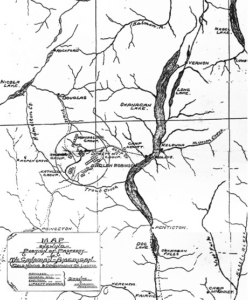
It was not till about 2:30 pm that the heart of the present townsite of Glen Robinson was reached and the approach to it from the east was so steep as to be anything but attractive. It was in this disturbed section the party ate their lunch and the prospect was so uninviting before them that the townsite idea was abandoned. However, Sam came and said, “You will have three stamp mills, one here, one at the Kathleen and one up north. Let this be your townsite. Remember, if you don’t like it others will come also into Rosebud Valley (Prairie Valley). It is highly fertile and will produce rich fruits. The water power too, is better than here. No, do not make your townsite where your camp is now. That lake (Headwaters Lake) will dry up. On Red Mountain, that big mountain on the south side of Rosebud Valley, there is some valuable mineral but you can get that next spring. Do not sell these claims. They will be valuable.”
After this little council was over, the horses were captured, and after ‘hitting the trail’, further progress was made up the valley. To the agreeable surprise of everybody, a few miles brought the party into a beautiful natural park and immediately the townsite proposition took definite shape.
Turning homeward we followed the old brigade trail, afterward found to be the Granite Creek trail. On the way home, the President’s horse gave out and its rider took his turn with the infantry.
At the camp, the group found the Vet and the Expert, who stated they had had some difficulty in following the lead, but had managed nevertheless to stake one claim on it, which they called the Lily R.
Thursday morning, the 23rd,
The President, the Vet and the Expert now set out to secure another million on Lipsett Mountain while the fine weather lasted. They found it in an extension on the main lead which they named the Dr. L. and then set their faces home-wards quite happy.
The Fable of the Grouse
On the way they sighted a grouse in a tree. As the President had fetched one down by firing no less than five hundred rounds the day before, he generously, in fact – with suspicious alacrity – yielded his revolver and cartridges to the Expert who was considered the dead shot of the party. The Expert braced himself for the occasion to maintain his reputation, but when he had fired five times without effect, the Vet, in disgust began climbing down off his horse. “Let me see that gun,” he said shortly. It was duly handed over, loaded and discharged as before, but without any better result, to the amusement of the bird and the satisfaction of the President, who kept cheering them on. Finally, when all the ammunition was used up in this way to no purpose and the Vet and the Expert began to get wild, eyes began to roll around in search of missiles. Stones were there in abundance so all formed a compact to fetch that bird down out of there, dead or alive. Forthwith the bombardment began and it was kept up for no less than two hours. Stones were heaved into the tree by the ton and five acres were cleared in the search for ammunition. Efforts were made to break up the bedrock with a pick but to little purpose, and the President was importuned to go after more stones. But he only sat on his horse and laughed – laughed till the tears coursed down his cheeks like mountain torrents while he shouted encouragement to the combatants. “Hit it again! Give him another! That’s it. Just one more in the same place and you’ll have him. Hit him again. He has no friends,” and such like cries he uttered till the belligerents were beside themselves with frenzy. Finally, when they got so mad they couldn’t see the tree and began pelting the horses by mistake, the President thought it was time to interfere. The horses cried, “Neigh, Neigh” then they just moved out of the way a bit and let the fun go on. However, as the President began to see an asylum looming up in the distance, he threw down his baton and declared the day won by the grouse. Then he gathered up the besiegers and started for home.
Meanwhile the grouse scratched his right ear with his hind foot reflectively and wondered what it was all about anyway. He had been scathed by a flying missile; in fact, it had brushed him off the limb but he caught on with his beak as he was going down and crawled back to await developments.
When travelers go by someday, they may see a tree buried from its roots to its topmost branches. Well, that’s the one in which the beleaguered grouse sat and enjoyed himself at the expense of the foolish prospectors.
Friday, Sept. 24th.
The party moved to the top of Mineral Hill today. The way in places was quite steep of ascent and the road over the side hills was grievously encumbered with fallen timber, and all but unknown to the Vet, who led the procession. When at dusk they reached the camp ground, all hands were so tired, hungry and dejected, all could have been bought as a job lot for $1.25.
On the way up, the President’s horse played out again and had to be left about two miles from the camp. One of the party hurried back after him and found him following the blazes by scent as they ceased to be visible to the naked eye in the failing light. Everybody was dog tired that night and slept right through without waking, ‘till roll call next morning.
Early the following day, the President went back after his horse and the Expert and the Vet set out to locate the fifteen claims which the latter maintained were badly needed. The Invalid remained behind as a home guard for the Medium and to rustle wood for the evening fires, no little task in that altitude and season.
From Sam on the J.M.R. claim, Mineral Hill, “We have four different minerals in our charge. Will give you a remarkable result, unexpected, unknown from what you have found.”
Also from the Bonanza King, “We are the centre of five different ledges. Three different minerals. From this spot you will be able to observe a strong lead of copper. Silver does not amount to much. Gold will pay”.
All this talk of riches made Billy favour performing for a good part of the evening. It was considered a work of great ingenuity and merit to try to channel his excitement so as to get him to leave the tent free for consultation. Various schemes were invented and tried.
The Invalid came near getting killed by encouraging this iniquity. He was just about to ask Billy to read aloud when his eye caught the President reaching for his gun with blood in his eye. He stopped just in time and gave a kaleidoscopic turn to his remarks. The Invalid wasn’t a bad sort of fellow in his way, but in this instance, he reminds one of the bull that disputed the right-of-way with a freight train – his pluck is to be admired, but don’t think much of his judgement.
Monday, Sept. 24th.
Early in the morning hours, the Vet and the Expert pushed out northward on another tour of discovery, while the President and the Invalid with axe and line began running the lines on the claim stakes. These claims lay on Mineral Hill, which no more a promising hill was discovered by this expedition. Now cap float was abundantly in evidence and the psychometric currents were so strong the Medium was unable to climb the hill, even with assistance. Five contact veins lay behind slate and dolomite, in a belt of gneiss and granite formation perhaps a mile in width.
In the evening the subject of return to civilization was brought up. The President introduced the idea under cover of a regard for the Medium’s health which was true, had not for some days been up to scratch. Camp life is all right in its place, but it is possible for one to have too much of a good thing.
Tuesday, Sept. 28
Today was a good day’s work. Setting out early, the President, the Vet and the Expert followed the main lead over Mineral Hill and far to the north. They came back in the afternoon highly pleased – all but the President, whose lunch, originally anchored to the back strap of his breeches, had slipped its moorings and left him only the sorry consolations of a missed feast. Said he didn’t care a picayune if they had staked claims of fifty million; what he wanted was something to eat. After the minister of the internal had attended to his case, he brightened up though, and decided to hang on to his millions in ‘the Bonanza King, Lucky Tom, Carberry and Prince of Orange’ all staked that day.
It was now fully decided that a start for Glen Robinson should be made on the morrow as the weather was getting altogether too cold for the Medium. It was also decided the President, the Medium and the Invalid should return to Rossland by rail, leaving the Expert and the Vet behind to finish up the prospecting about Glen Robinson and to stake out a townsite.
Last Days in the Wilderness
The Expert had to shout, “Ho Billy!” but once next morning to arouse the whole camp, for all were glad enough to get down off the coldest roost they had found in their travels and to settle in the milder climate of the valley below. The party reached the Headwaters lakes in time for a late luncheon.
It was just dusk when the cavalcade halted in Glen Robinson, and before the horses could be unpacked and the fires attended to it was right dark. Everybody was tired and in the worst of bad twist when camp was made.
After dinner , the Vet cut down trees and skinned them by the light of the camp fire for mattresses, and by ten o’clock had forgotten about sorrows and joys in the profound sleep that comes to the weary.
Thursday, Sept 30.
God blessed the party with rain but the tops of the mountains were whitened with a skiff of snow. It looked like a very pretty day, but time was short now, so the President and the Vet set out to gather samples at the Alura claim, while the Expert and the Invalid climbed the hill south of the lakes.
In the evening Sam came for his last chat in the wilderness. He said, “It is all right to take the Medium home. Between the last claim you staked are other good claims tending more and more to copper. I will keep this for you until you get it in the spring. That mountain is high and will be covered late in the spring with snow. There is great wealth here for you and great responsibility. On the other side of the mountain, across the lake will be found more wealth. Stake all you can and get all the land you can now. Yes, I will come and assist those who remain as far as I can and report to you in Rossland. Goodbye.”
Friday, Oct. 1.
It was raining again this morning when they awoke, but little they cared who are going home. Their greatest fear was that the horses were lost. They were not however, so bidding a goodbye to the Expert and the Vet, which they vainly and hypocritically tried to make solemnly becoming, they set out with Billy and a pack horse for Lambley’s Landing.
The morrow found them on the S.S. Aberdeen, steaming up Lake Okanagan in the direction of Vernon where it became necessary to stay over ‘till Sunday.
While camped at the Hotel Kalamalka, the identity of the party soon became known and the Medium and the President became objects of interest; the landlady showed every attention to the wants of her guests, especially the Medium, and in due time the motive for her solicitude came to light – she wanted her fortune told.
It appeared there could be no such thing as travelling incognito now. The news of the Medium’s reading of rock at Camp McKinney, right to the letter, had preceded her to Vernon; and the Medium was eagerly invited to stay over a week, or to stay all winter, and every assurance was given that she would be well paid for her time.
But their hour had come too late. The Medium, now “the richest woman in Canada” did not want anyone to patronize her, so she declined with thanks and on the following Monday proceeded homeward with the party.
A night was spent at Sicamous Junction station on account of swift train service, and a day at Revelstoke where it was decided by the President that it would be well to take in the Commonwealth (mining region) on the way home.
That night they reached Thompson’s Landing, on the Arrow Lake, in the dark and next day set out for Trout Lake, twelve miles inland. On the way we passed quite a number of prospectors coming in from the hills with their kits slung over their backs.
They all arrived at Trout Lake, and the saw mill man was found on hand and was cordially greeted. All hands adjoined to the hotel for lunch, after which horses were procured and Cousin Fyfe led the way ten miles north to the Glenside cabin.
So, after Cousin Fyfe and the President and the Medium had visited the Vera mine (the President was an investor), a start was made for home. These two days were long, hard ones for the Medium, and those effects she felt long after her return to Rossland.
At Trout Lake, the Invalid deserted the party to go hunting for grizzlies with Cousin Fyfe and would join the President and the Medium in Rossland at a later date.
In due form and order, the Medium and the President reached Rossland after an absence of more than two months, in which more than five hundred miles had been covered in the saddle without accident, and practically without illness.
A great howl went up on their arrival in the Rossland camp, a howl which was revived a week later on the arrival of Cousin Fyfe and the Invalid with two hides – all their own. Six weeks later when the Expert, his wife, and the Vet had also come back to the nest, there was held the grand finale of which the President had been giving dark hints all summer. Old scores were uncovered and honestly treated through antiseptic and caustic treatment.
The scene was wild and stormy but no neighbours interfered, the impression having gone abroad that the inmates of that house were harmless but noisy unfortunates for whom some degree of charitable allowance must be made.
Epilogue
Thus, dear reader, patient and long suffering, I end where I began, in Rossland, leaving you to pray that never again may I be tempted beyond my strength, to take up paper and pen, and write. J.M.R.
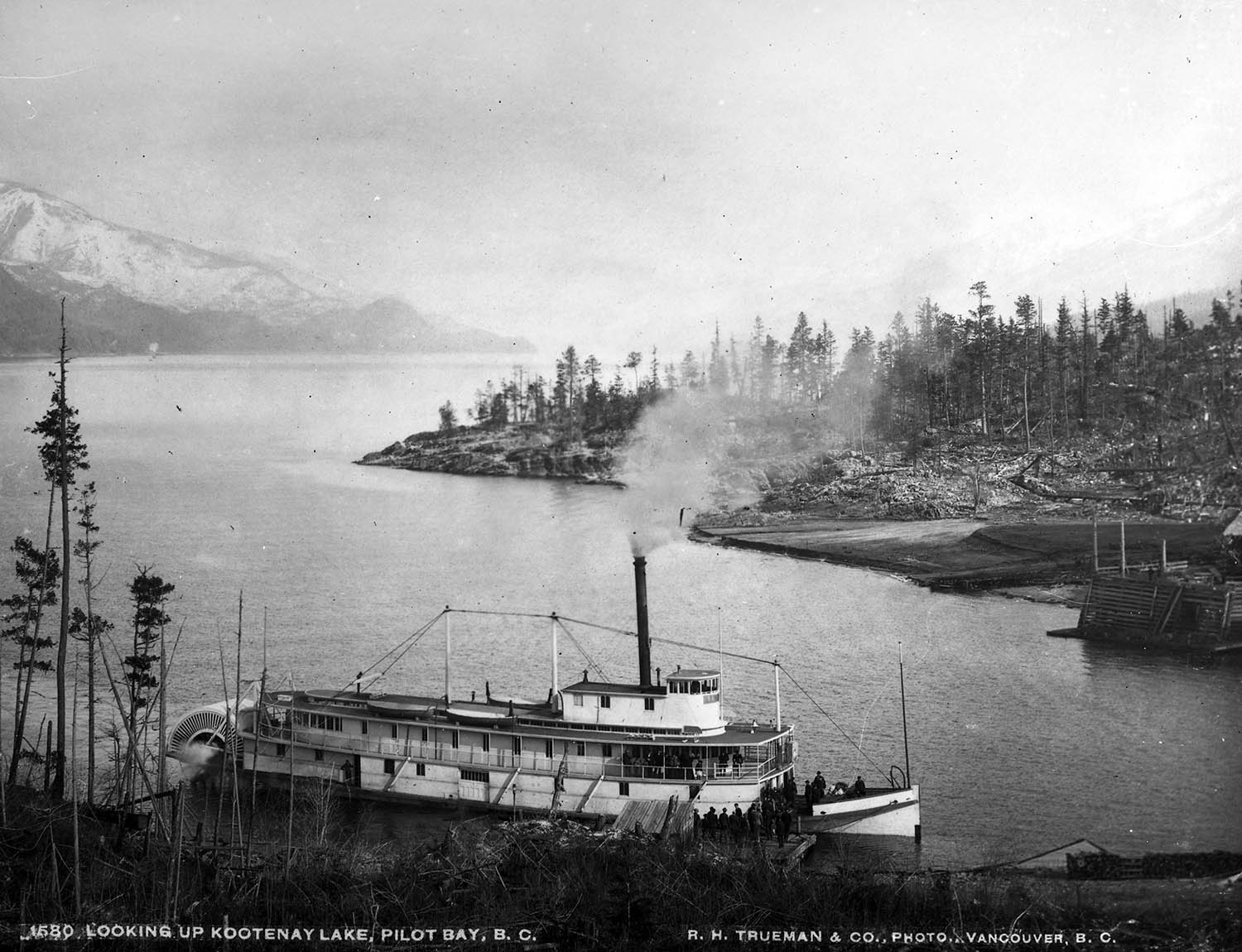
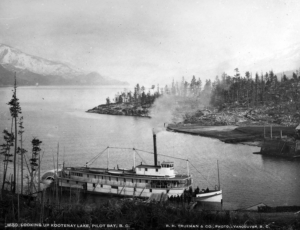
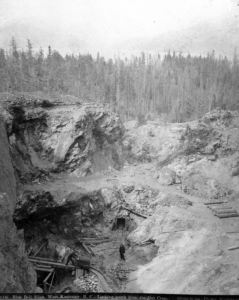
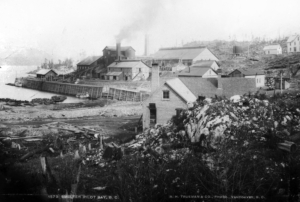

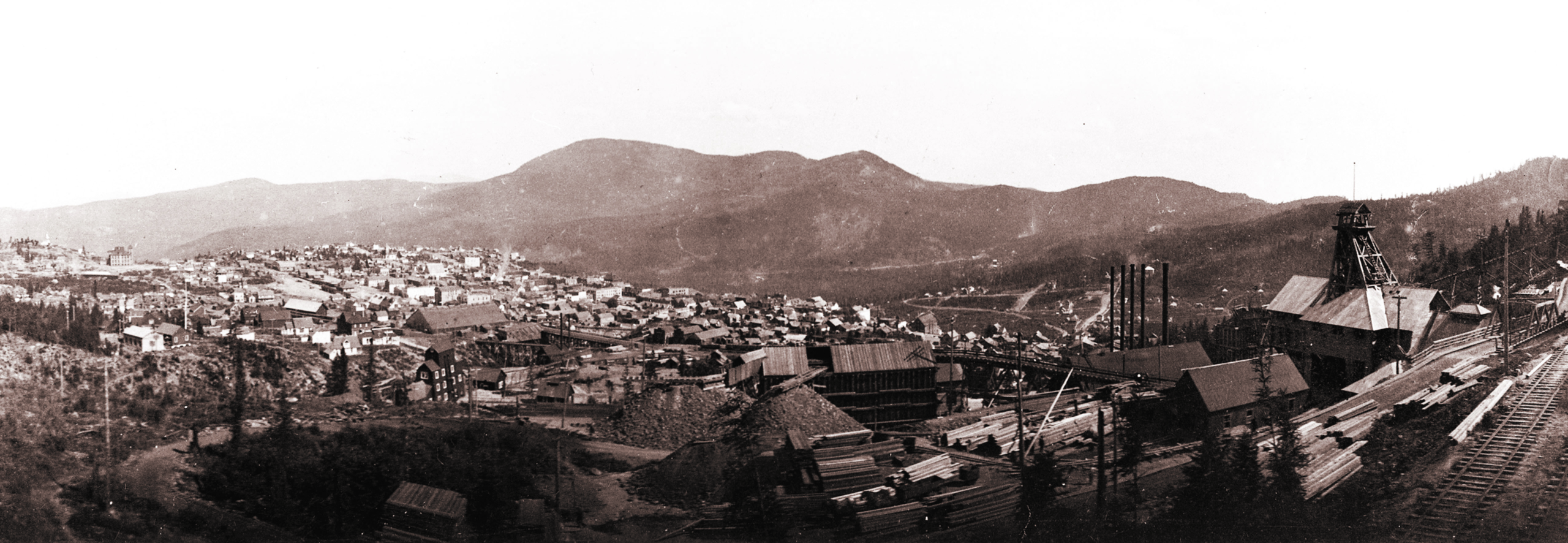
 mystery.
mystery. Rossland mining camp is a crow’s nest at the top of the mountain. It is situated about 4,500 feet above sea level, so high that all the inhabitants have to do when they want snow is to go outside and scrape it off the first cloud that comes sailing by.
Rossland mining camp is a crow’s nest at the top of the mountain. It is situated about 4,500 feet above sea level, so high that all the inhabitants have to do when they want snow is to go outside and scrape it off the first cloud that comes sailing by.

 Husbandman only knows.
Husbandman only knows. down the divide we gathered in eight grouse and two rattlesnakes. Our camp for the night fell near an Indian village that had been a Hudson Bay post a generation before (Osoyoos) but was now fallen entirely into the hands of the local Indians, a tribe of red men, more broad of feature, more thick set in stature and more intelligent than our own Manitoba Indians. The women of the company were cheerfully engaged in washing buckskin gloves and gossiping when we came up, while there sat in the shade of his hut at a little distance, a wizened up, carved and wrinkled effigy of the male that was designed for old Ayesha, the witch, in Rider Haggard’s tale.(“She” 1886) He had dispensed with the formality of a shirt, and was religiously endeavouring to eat his bite and keep cool at the high time. He was deaf as a post and over a century old, a woman informed us who came up at this moment, dragging the winter’s firewood after her.
down the divide we gathered in eight grouse and two rattlesnakes. Our camp for the night fell near an Indian village that had been a Hudson Bay post a generation before (Osoyoos) but was now fallen entirely into the hands of the local Indians, a tribe of red men, more broad of feature, more thick set in stature and more intelligent than our own Manitoba Indians. The women of the company were cheerfully engaged in washing buckskin gloves and gossiping when we came up, while there sat in the shade of his hut at a little distance, a wizened up, carved and wrinkled effigy of the male that was designed for old Ayesha, the witch, in Rider Haggard’s tale.(“She” 1886) He had dispensed with the formality of a shirt, and was religiously endeavouring to eat his bite and keep cool at the high time. He was deaf as a post and over a century old, a woman informed us who came up at this moment, dragging the winter’s firewood after her.  ranchers, whose cattle manage to pick up a living by working faithfully on day and night shifts. If the valley were only irrigated it could look like a paradise.
ranchers, whose cattle manage to pick up a living by working faithfully on day and night shifts. If the valley were only irrigated it could look like a paradise. 

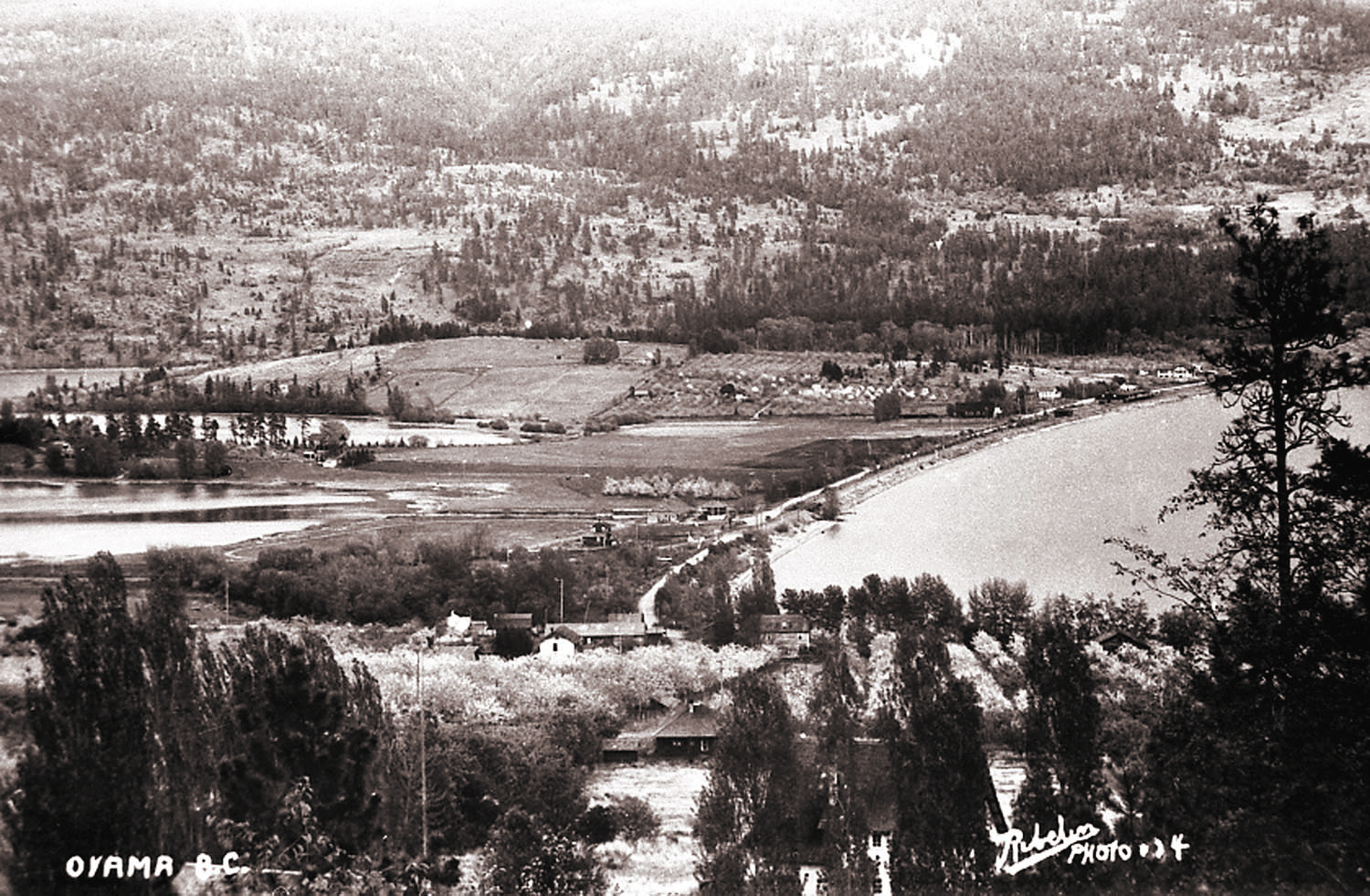
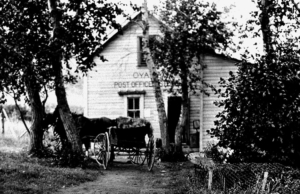
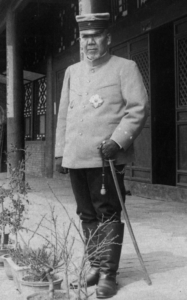
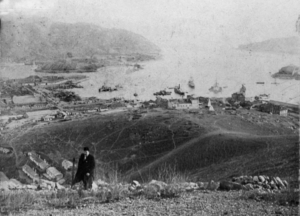
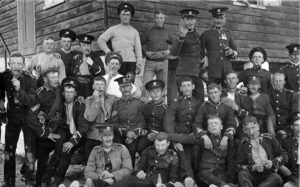
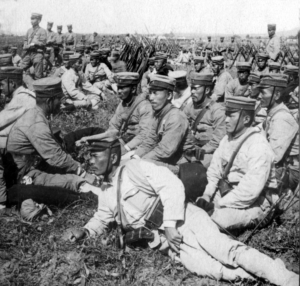
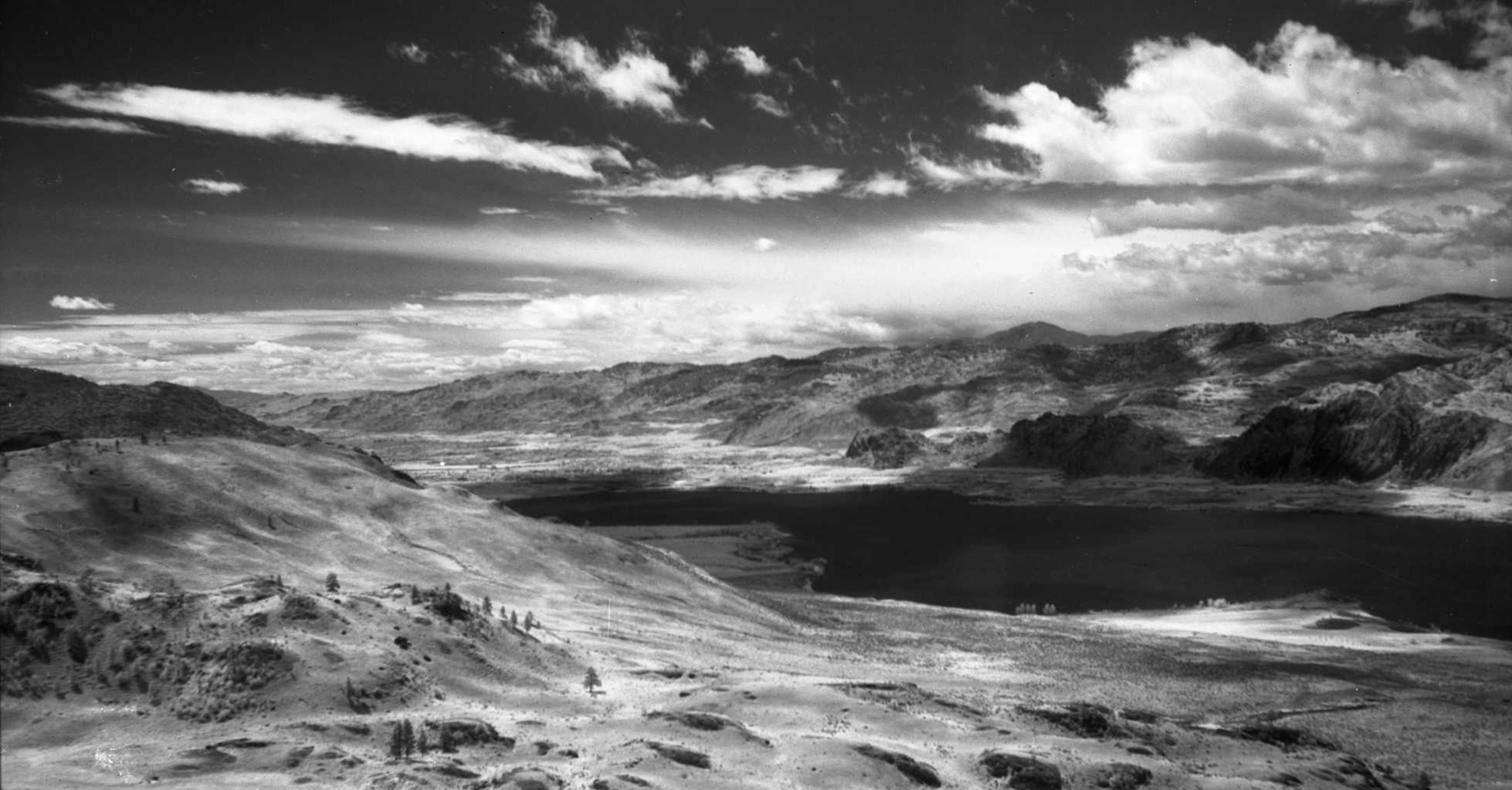
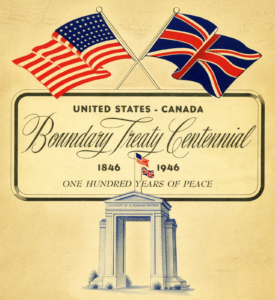
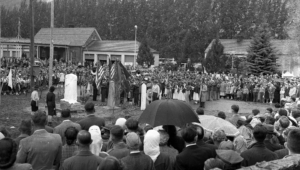
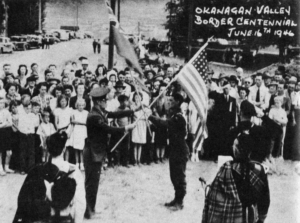
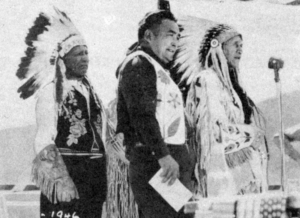
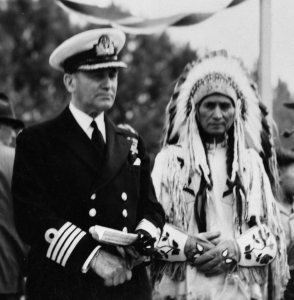


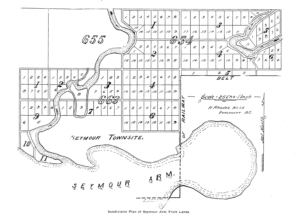
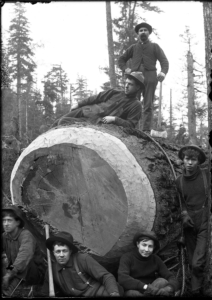
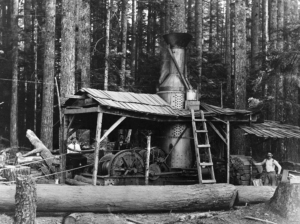 When I was a boy my father sometimes took me to watch the powerful logging machines at work. It really was an exciting experience to watch these steam engines pull these tree-length logs three to four feet in diameter through the woods. The men who operated these steam donkeys were masters of their art and as a boy, it was exciting to watch the men unloading these machines from the barges they brought them in on. They would move these big machines ahead on the barge until they were ready to tip over, then yank the throttle wide open and they would leap onto the beach. They would have a team of horses roll the cable from the first donkey out to its length and anchor to a tree. The others would attach their cable to the one ahead so when the first donkey pulled itself ahead, it would pull the cable of the second donkey out and then it would pull itself up to the first donkey and so on until they reached their work point. I think my greatest ambition as a boy was to be a donkey puncher, as the men who operated them were called. In the winter they used a lot of horses when logs could be hauled on the snow on large, two-runner sleighs, called sloops. The roads were watered to create ice roads so two horses could move large loads. They used another team called a snatch team to start the load moving
When I was a boy my father sometimes took me to watch the powerful logging machines at work. It really was an exciting experience to watch these steam engines pull these tree-length logs three to four feet in diameter through the woods. The men who operated these steam donkeys were masters of their art and as a boy, it was exciting to watch the men unloading these machines from the barges they brought them in on. They would move these big machines ahead on the barge until they were ready to tip over, then yank the throttle wide open and they would leap onto the beach. They would have a team of horses roll the cable from the first donkey out to its length and anchor to a tree. The others would attach their cable to the one ahead so when the first donkey pulled itself ahead, it would pull the cable of the second donkey out and then it would pull itself up to the first donkey and so on until they reached their work point. I think my greatest ambition as a boy was to be a donkey puncher, as the men who operated them were called. In the winter they used a lot of horses when logs could be hauled on the snow on large, two-runner sleighs, called sloops. The roads were watered to create ice roads so two horses could move large loads. They used another team called a snatch team to start the load moving 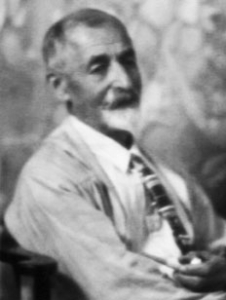 people: father, mother, and two sons, Carl and Guy.
people: father, mother, and two sons, Carl and Guy. 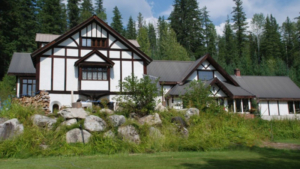 The original house was small and built from cedar logs stood on end on a wooden foundation. Some years later they built a two-storey addition more than twice the size of the original house and it was built on a cement foundation. In Guy’s last years he built another addition to the back of the newer part of the house. It was a beautiful billiard room. The family also had a large grand piano in the living room as both Mr. and Mrs. Collings were pianists. This large piano was built into the house so the only way it could be taken out would be to take it to pieces or take the end wall out of the living room. The living room also had a large home-made stone fireplace and a lot of ornaments that Mr. Collings had brought from various parts of the world. One of those was a music box that was gifted to the Collings from former U.S. president Theodore Roosevelt. This amazing music box played the big huge steel discs, so when I would go over there the one song that the boys just loved to play was “Listen to a Mockingbird”. The huge steel things would play that in a trill that this music box made it sound so incredible it almost brought tears to your eyes.
The original house was small and built from cedar logs stood on end on a wooden foundation. Some years later they built a two-storey addition more than twice the size of the original house and it was built on a cement foundation. In Guy’s last years he built another addition to the back of the newer part of the house. It was a beautiful billiard room. The family also had a large grand piano in the living room as both Mr. and Mrs. Collings were pianists. This large piano was built into the house so the only way it could be taken out would be to take it to pieces or take the end wall out of the living room. The living room also had a large home-made stone fireplace and a lot of ornaments that Mr. Collings had brought from various parts of the world. One of those was a music box that was gifted to the Collings from former U.S. president Theodore Roosevelt. This amazing music box played the big huge steel discs, so when I would go over there the one song that the boys just loved to play was “Listen to a Mockingbird”. The huge steel things would play that in a trill that this music box made it sound so incredible it almost brought tears to your eyes.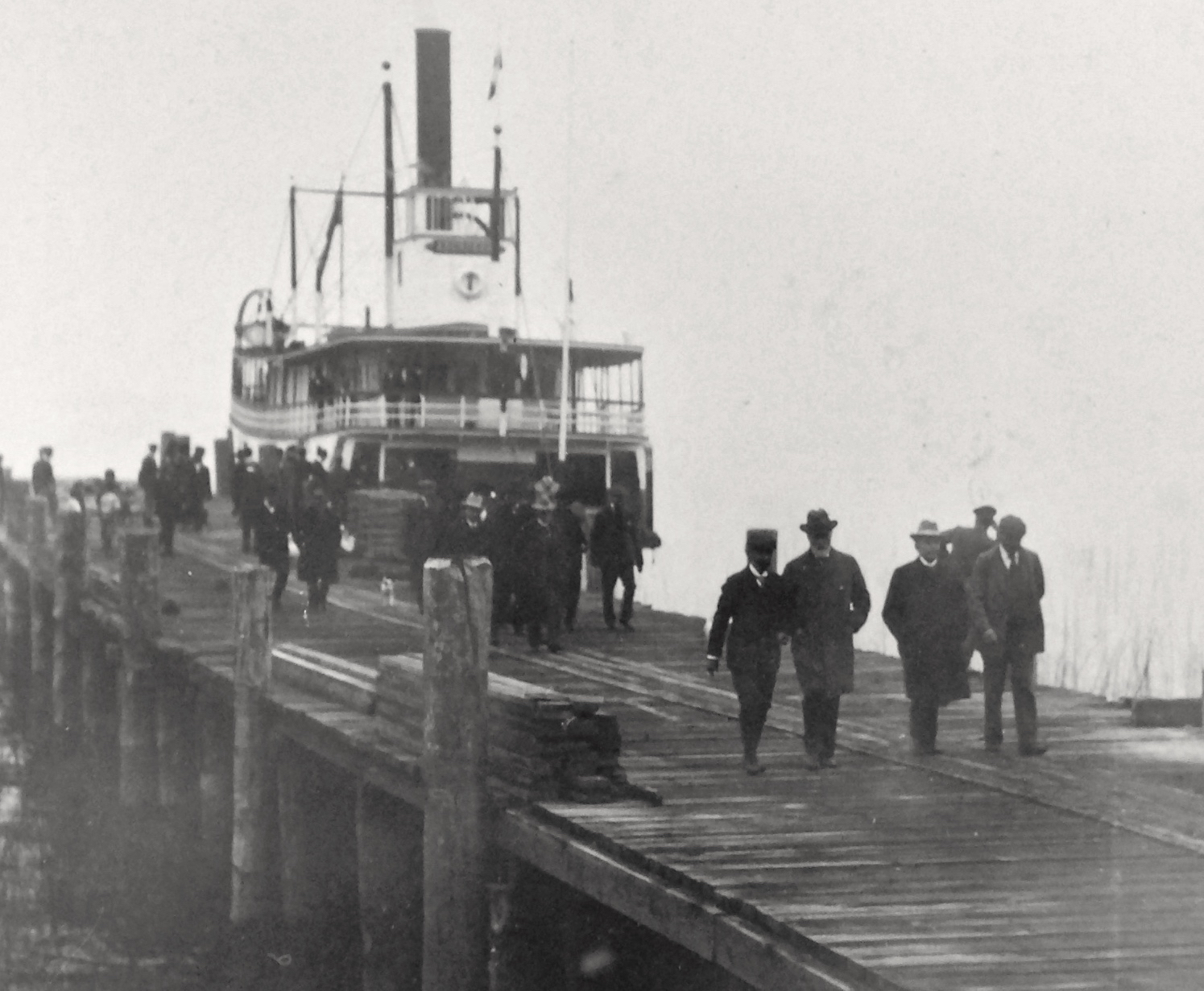
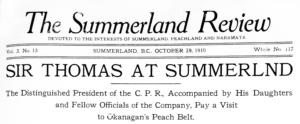 In the year 1900, the Canadian Pacific Railway made the decision to acquire 10,000 acres of land in the Interior of British Columbia to grow fruit for their new C.P.R. hotels. By 1901, after an extensive search, two properties were short-listed. The Kamloops proposal was dropped because of questionable water reliability. The Trout Creek property, in the centre of the Okanagan Valley, was also dropped because there wasn’t enough acreage; only 4,000 acres. So the C.P.R executive abandoned the idea. But C.P.R. President Sir Thomas Shaughnessy (1853-1923) decided to personally proceed with the acquisition of the Trout Creek property.
In the year 1900, the Canadian Pacific Railway made the decision to acquire 10,000 acres of land in the Interior of British Columbia to grow fruit for their new C.P.R. hotels. By 1901, after an extensive search, two properties were short-listed. The Kamloops proposal was dropped because of questionable water reliability. The Trout Creek property, in the centre of the Okanagan Valley, was also dropped because there wasn’t enough acreage; only 4,000 acres. So the C.P.R executive abandoned the idea. But C.P.R. President Sir Thomas Shaughnessy (1853-1923) decided to personally proceed with the acquisition of the Trout Creek property.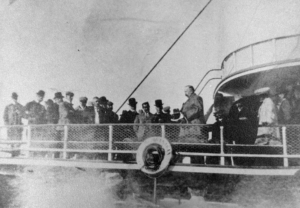 Shaughnessy created the Summerland Syndicate to purchase Barclay’s Trout Creek cattle ranch. By August 1902 the sales agreement between George Barclay and the Summerland Syndicate was completed.
Shaughnessy created the Summerland Syndicate to purchase Barclay’s Trout Creek cattle ranch. By August 1902 the sales agreement between George Barclay and the Summerland Syndicate was completed.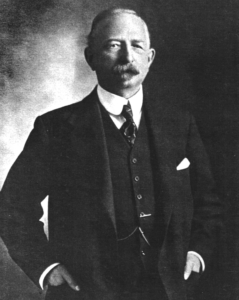 the water system, the road system, the electrical system (first community in the Okanagan) and his company assisted with the telephone system. Shaughnessy moved quickly. In the Fall of 1902, his company built the Summerland Hotel.
the water system, the road system, the electrical system (first community in the Okanagan) and his company assisted with the telephone system. Shaughnessy moved quickly. In the Fall of 1902, his company built the Summerland Hotel.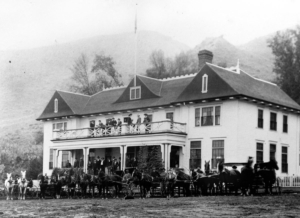
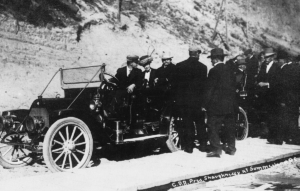
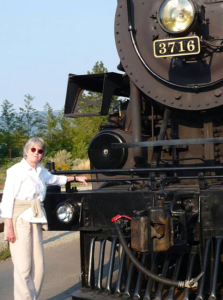
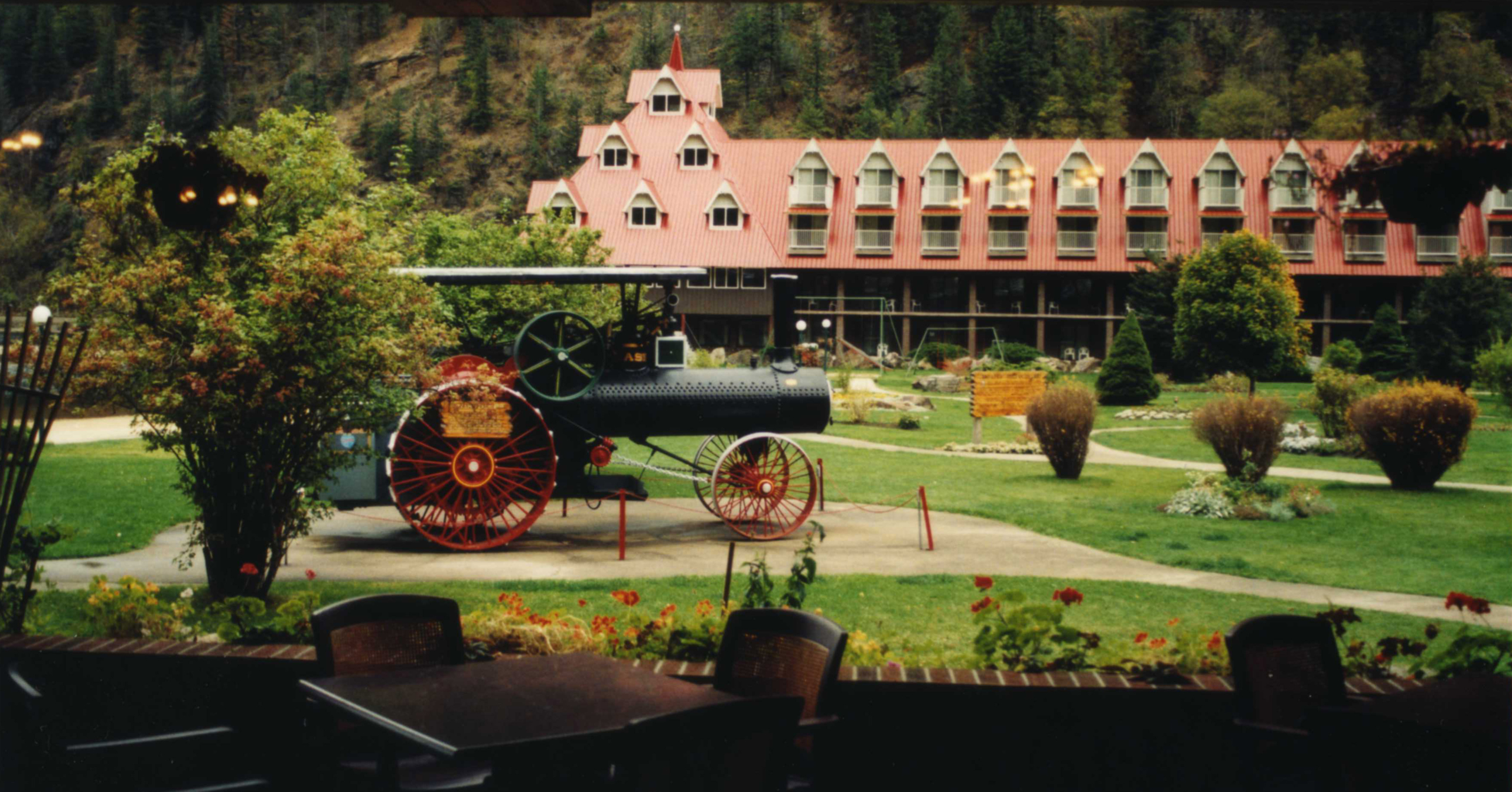
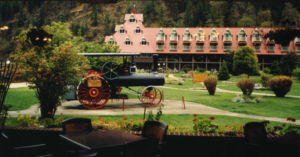
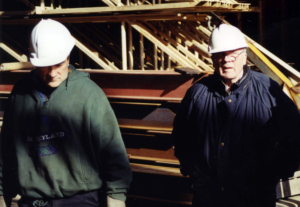 Son George Bell and Gordon Bell
Son George Bell and Gordon Bell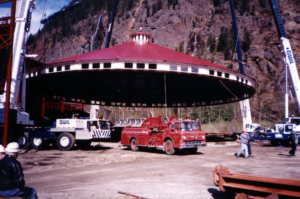 Four giant cranes from the GWIL firm were on site setting up, and a check with the loadmaster revealed that Tuesday morning, April 20th, the lift was to start at 8am. However, Mr. Bell, who engineered the whole project, pointed out that one crane would have to be re-rigged as the lifts must be positioned 90 degrees apart. This was not the case. Re-rigging took place on one crane at 8:15 and by 9am the set-up was done. The lift started at 9:30 and all four cranes lifted in unison. By 10am it was obvious that this 53.5 ton roof section was starting to move in the breeze slightly and appeared to resemble a flying saucer. Streamer ropes attached to the roof were then tied onto vehicles on site as anchors and the motion was soon controlled.
Four giant cranes from the GWIL firm were on site setting up, and a check with the loadmaster revealed that Tuesday morning, April 20th, the lift was to start at 8am. However, Mr. Bell, who engineered the whole project, pointed out that one crane would have to be re-rigged as the lifts must be positioned 90 degrees apart. This was not the case. Re-rigging took place on one crane at 8:15 and by 9am the set-up was done. The lift started at 9:30 and all four cranes lifted in unison. By 10am it was obvious that this 53.5 ton roof section was starting to move in the breeze slightly and appeared to resemble a flying saucer. Streamer ropes attached to the roof were then tied onto vehicles on site as anchors and the motion was soon controlled.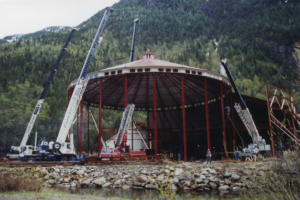 Gordon was on the roof of the museum building to receive and guide into place the new roof section. The alignment was perfect. The next step was to lift into place the remaining 24 “I” beams to support the roof section other than at the museum building proper. This task was completed by a local crane company who worked under the 53.5 ton roof section while the GWILL cranes maintained their lift. Finally by 15:30 the roof was lowered into place on the “I” beam columns. Welding the roof to the “I” beams was the next step while the GWIL cranes prepared to depart from their two-day task.
Gordon was on the roof of the museum building to receive and guide into place the new roof section. The alignment was perfect. The next step was to lift into place the remaining 24 “I” beams to support the roof section other than at the museum building proper. This task was completed by a local crane company who worked under the 53.5 ton roof section while the GWILL cranes maintained their lift. Finally by 15:30 the roof was lowered into place on the “I” beam columns. Welding the roof to the “I” beams was the next step while the GWIL cranes prepared to depart from their two-day task.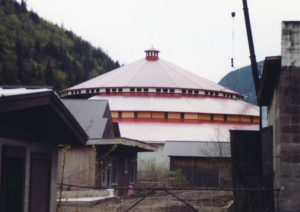
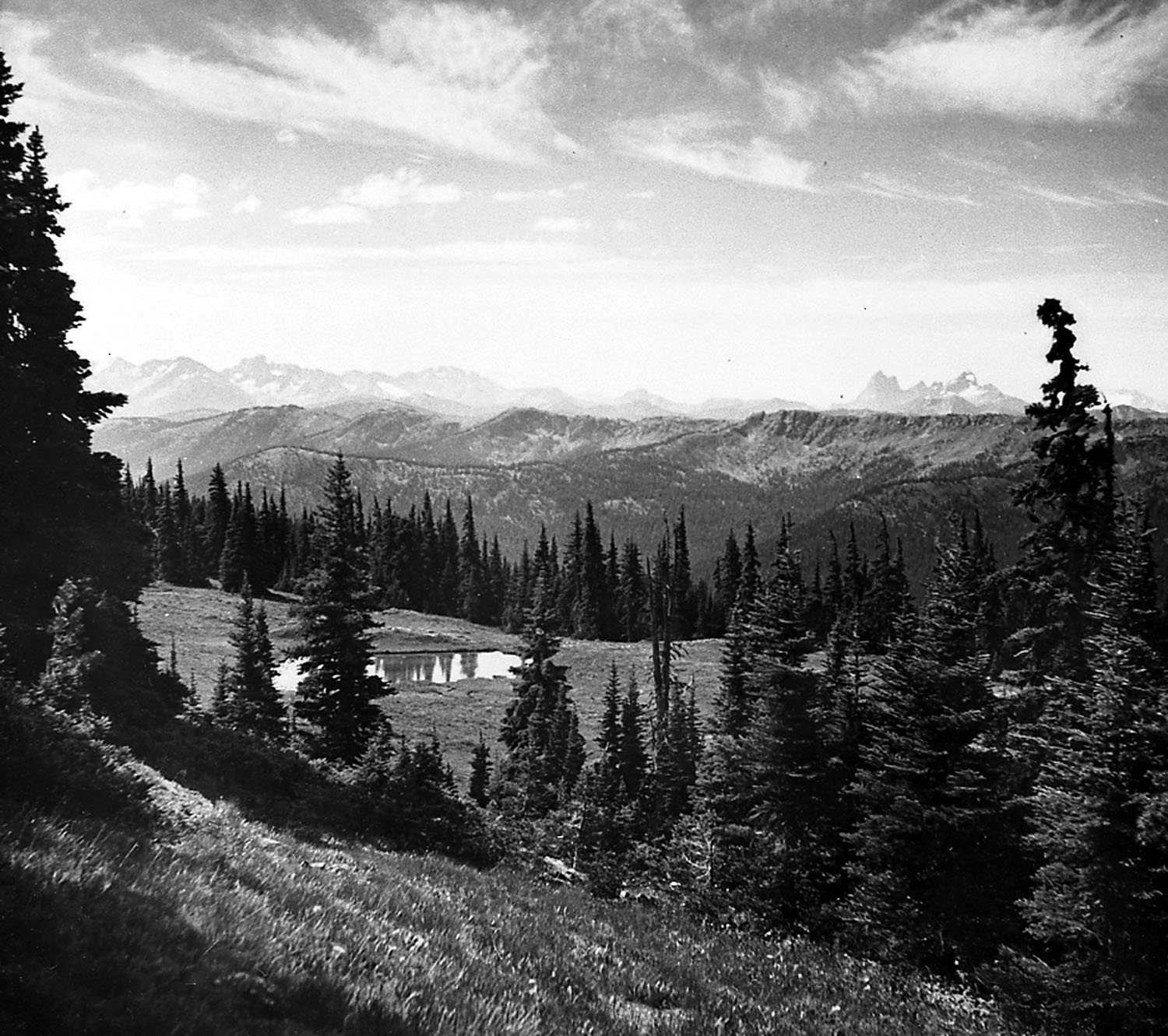
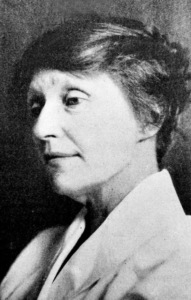 Princeton in 5 days over the well-marked pack trail.
Princeton in 5 days over the well-marked pack trail.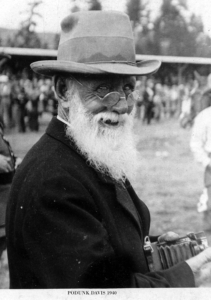 Cascade for most of his life. He made a few dollars as a guide and packer for those travelling the trails from Hope. He had the survival skills of a native.
Cascade for most of his life. He made a few dollars as a guide and packer for those travelling the trails from Hope. He had the survival skills of a native.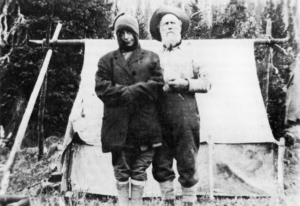 at the trailhead near Whipsaw Creek. Fred went ahead at this point and arranged a cart to be sent up to fetch her. Mrs. Barrington-Foote heard the news and insisted on coming along to help as only another woman could in this situation. She was taken to Princeton Hospital where she was tended to. She weighed in at just over 80 pounds.
at the trailhead near Whipsaw Creek. Fred went ahead at this point and arranged a cart to be sent up to fetch her. Mrs. Barrington-Foote heard the news and insisted on coming along to help as only another woman could in this situation. She was taken to Princeton Hospital where she was tended to. She weighed in at just over 80 pounds.